Text
Judai and Yubel's Chemical Wedding
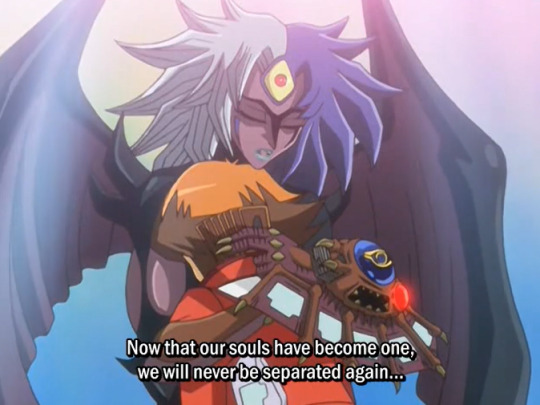
A chemical wedding is central to many alchemy stories.
A chemical wedding is a reconciliation of opposites, often with the most significant character relationship to the protagonist. A relationship which destroys and then remakes them in the better version of themselves.
Jung said that relatioships are chemical reaction. If you have a reaction you can never return to your previous state of being. That's ultimately the role of a chemical wedding in a story. A relationship which is central to a character's development, and changes both parties.
Yubel isn't just important for Judai's character development, they're literally his other half and their union of opposites completes them both in an alchemical sense. Keep on reading below the cut for a lesson in alchemy symbolism.
Peter Pan's Missing Shadow
So, the story goes somewhere in the middle of developing season two the writers recognizing that Judai, would never be able to handle a Marik level antagonist. He lacked maturity compared to the previous series protagonist Atem. The concept of Yubel emerged to make Judai grow, because as he was, he wasn't enough.
Judai fits the archetype of the hot-blooded shonen protagonist almost perfectly in the first two seasons, but even in two seasons where he changes very little as a character the hints are there.
Sho immediately puts Judai on a pedestal, and soon so does everyone else. Judai is praised for his pure heart over, and over. The standards for Judai are set so high you begin to wonder what if Judai wasn't the person everyone sees him as?
At this point is it even Judai that his friends are seeing?
What does that do to a person's identity when everyone around you is love with the idea of you. When you're not seen as a person with flaws.
Judai doesn't grow but how can he, when he's not really allowed to make mistakes. When he's expected to always be cheerful, and always bounce back without help or support.
Judai is pure of heart, but is anybody really pure? The light always casts a shadow.
Jung pioneered a lot of analytical psychology theory. Jung divided the psyche into four parts, the persona which is how we externally engage with the world our public face, the animus and anima masculinity and femininity, and finally the shadow.
Complementary to Jung’s idea of the persona, which is “what oneself as well as others thinks one is” [CW9 para 221], the “shadow is that hidden, repressed, for the most part inferior and guilt-laden personality [...] that is his shadow does not consist only of morally reprehensible tendencies, but also displays a number of good qualities, such as normal instincts, appropriate reactions, realistic insights, creative impulses etc “
The shadow isn't made up of bad qualities, just what we are afraid to show others because of judgement. Hidden as it may be, the shadow is a fundamental part of your personality.
Jung had a deep interest in the shadow – its form and content – and in the process of assimilating “the thing a person has no wish to be” [CW16, para 470]. He saw quite clearly that failure to recognize, acknowledge and deal with shadow elements is often the root of problems in relationships.
Is a friendship with someone real if you're afraid to show any of your flaws?
Juda's never allowed to make mistakes around his friends. He's under constant pressure to fight their battles, to fear he might lose them if he loses.
Ryo, a foil and rival Judai suffers a complete breakdown after losing just one duel. Before that he spelled it out for Judai in the graudation duel, the "perfection" everyone expected limited his growth, until he finally fell apart. If one loss makes Ryo fall then how much farther does Judai who's under more pressure have to fall?
Judai hides his shadow from everyone, but the shadow isn't just a part of you. The shadow is you. You are your shadow. Which is why recognizing the shadow is a critical part of growth - and alchemy. As Jung once said, "The gold is in the dark. And one does not become enlightened by imagining figures of light, but by making the darkness conscious.”
Judai's in unable to grow up, because like Peter Pan is missing his shadow. It needs to be retrieved and sewn back to his feet. Until then, he's stunted and missing an important part of himself.
Judai is missing something important without his shadow. I'm not pulling this from thin air, it's directly stated by the text repeatedly.
Here.
Kouji Satou: We have something that you lack.
Judai: That I lack?
Kouji Satou: Yes the darkness of the heart that slumbers deep within a duelist. The burden that a duelist bears in his heart. Judai, you have none of that.
Here.
Cobra: You are certainly a talented duelist. But you have one fatal flaw.
Judai: A fatal flaw?
Cobra: Yes, your duels are superficial. Someone who fights with nothing on his shoulders, cannot recover once he loses his enjoyment. What a duelist carries on his shoulders will become the power that supports him when he’s up against the wall!
Cobra: But you have nothing like that! Those who go through life without anything like that cannot possibly seize victory.
Cobra: But I know that nothing I say will resonate with you… because you have nothing to lose but the match.
Even, by Judai himself.
Judai: They’re all… They’re all gone. There really was something missing in me. But what is it? What was missing? What should a duelist burden themselves with?
I often worry people will misinterpret Judai's ending with Yubel is unhealthy because he's "caving to the demands of a stalker."
Yubel's not a stalker, they're not even a real person. Judai's a character in a story, experiencing an arc about learning to accept and grow path his worst flaws. How could that arc end with throwing away Yubel, who represents the ugliness Judai tries to hide?
Yubel is Judai's shadow, run away from him just like Peter Pan. Yubel's more than just a cast-off shadow though, Yubel is Judai. A good example of two separate characters coded as each other's shadows in other literature is Katherine and Heathcliff, two characters designed specifically to be two halves of a whole. Katherine once said, "I am Heathcliff", or to be specific she said:
My great miseries in this world have been Heathcliff’s miseries, and I watched and felt each from the beginning: my great thought in living is himself. If all else perished, and he remained, I should still continue to be; and if all else remained, and he were annihilated, the universe would turn to a mighty strange: I should not seem a part of it [...] Nelly, I am Heathcliff!
Katherine - Wuthering Heights
So these are two different topics, shadow as a literary foil, and shadow as an aspect of peresonaity in Jungian psychology, yubel is both.
Yubel is the archetypal shadow character, a character who challenges the main character by being their internalized flaws made external.
In a Jungian text when a character won't look at their shadow, they're often forced to look by being confronted with an externalized version of their shadow.
This is the first line of dialogue Yubel says that's not chanting Judai's name in episode 117 to Amon.
Yubel: My power is not especially great. But those with darkness in their hearts can unleash great power in me.
Yubel: The pus welling out of your injured heart forms a second heart. I can see that other heart. The darkness in it.
Yubel: That's right. That is the darkness of your heart. it's there, in the depths of your mind. Th scream of your other heart, born from your stagnant blood!
Yubel's go-to strategy with manipulation is to throw in a character's face the secrets they've been hiding to make them more liable to their will. Until Yubel can reconstitute their own body, they're forced to act entirely through others, possessing Cobra, then Martin, and finally Johan.
Yubel, the runaway shadow can't exist in this world without glueing themselves onto someone else. Can't be whole without Judai.
Yubel: You'll formally become king.
Yubel: It must be great to have your wishes come true. But then, who's going to be happy for you?
Yubel: Living in a way that suits you. The one who'd be most happy for you would be that "echo" woman that you loved, am I right?
Yubel: But you went and let her die. You won't even be able to see her celebrate, isn't that a bit weird to you?
Amon: Silence...
Yubel: I know I couldn't stand it. A world without the one I love. It's because of Judai I can feel pain, angiush, and agony.
They say it over and over again, a world without the person you love, even a perfect one like Amon imagines, isn't worth living in.
Yubel: I wouldn't want to live in such a world!
Yubel: The world is a place that you make alongside the one you love! What Judai and I make together... that will be the world!
It seems like a one-sided dependence on Yubel's part, but because Yubel is Judai's shadow, Judai cannot exist without them either.
Yubel was literally introduced into the story to spur Judai's character growth after two seasons of stagnation.
Judai seems better off without Yubel. Judai even suggests as much, that it might have been better for Yubel to die in that crater, than crawl back to Judai in their wounded and hateful state.
It seems that Yubel's reapperance triggered Judai's breakdown, and without it the breakdown never would have happend. However, there's two seasons of foreshadowing that JUdai is "missing something" without Yubel, which is why they can't grow or adapt to new circumstances. Judai needed to go through a death of his old self, a loss of innocence to become someone new, that's how alchemy works, that's how growing up works.
JUdai needed to reintegrate his shadow (Yubel) so he could become aware of his flaws, and while he does hit a low point, in the aftermath he can finally better himself.
The question is what flaws of Judai does Yubel reflect?
At first brush they seem as opposed to each other as hero and villain.
There's a tragic symmetry to the way both of them lived their lives for the past ten years. They began in the same place, Judai's childhood was just the two of them together. Then Yubel drove all of Judai's friends away, and Judai sent Yubel away in return.
Ten years go by and Judai attends Duel Academy and makes friends for the first time. He learns of his destiny was the one to protect Neo-Space and the Neo-Spacians led him their power helping awake within him the power of the gentle darkness. Judai spends almost two years almost always surrounded by people, alone in the center of a crowd.
At the same time Yubel has spent the past ten years alone in space, crying out for help from Judai. When they finally return to earth they ask for help one final time only to be met with silence. In that moment Yubel decides that silence is their answer, that abadoning Yubel, ignoring their screams of pain and forgetting them was all Judai's way of showing love.
Judai awakens his powers of the gentle darkness, whereas Yubel is corrupted by the light of destruction. Judai receives the help of everyone around them, Yubel only survives by manipulating several people to eventually crawl their way back to Judai.
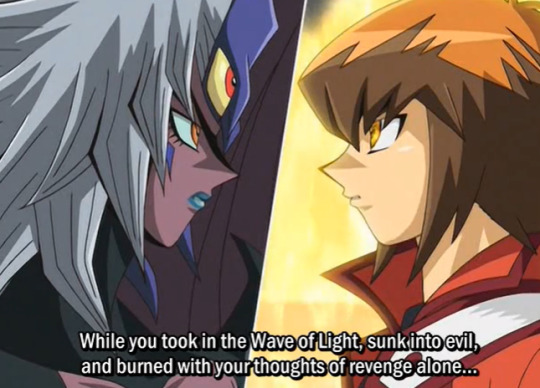
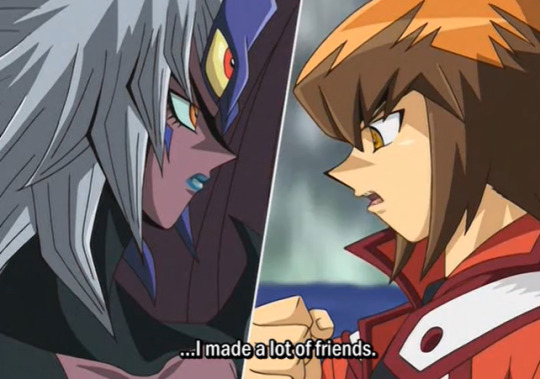
They started at the same point, but by the time they meet again they're completely unrecognizable to each other.
As easy as it is to see them as villain and victim you can flip their roles too. As Judai is responsible for the chain of events that led to Yubel's torture, from Yubel's point of view they are the victim and Judai the villain.
It's unfair to hold a decsion they made when they were five against him. However, abandoning Yubel is a choice Judai continually makes, even after learning Yubel's undergone ten years of torture they were responsible for.
Judai: Yubel didn't come into being by coincidence. I made them who they are.
Judai continually ignores Yubel to search for Johan. However, he's not responsible for Johan. Johan made the choice to sacrifice himself. Wanting to save Johan isn't bad of course, but wanting Johan back is about what Johan represents to Judai not who he is as a person.
Yubel rightfully points out Judai will go so far to save Johan, but won't lift a finger to help them.
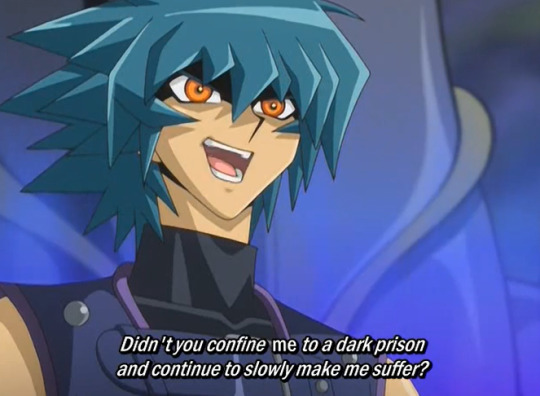
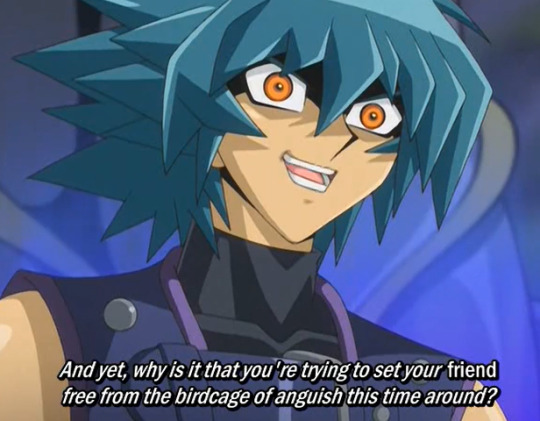
In fact Judai's obsession with Johan, is a narrative flaw (one Yubel reflects for the audience). It leads to his destruction.
Sho even calls him out, his willingness to sacrifice anyone, including his friends for Johan's sake. It's selfishness on his part. To quote this post:
The way he goes after both after Johan in season three and O’Brien shows that he actually doesn’t care all that much for them as people. To him, they represent a concept: Victory, or at the very least atonement for his past actions. A convenient way to right what he did wrong.
That is not to say that he doesn’t like them as people - he does. But when the chips are down, what he ultimately wanted was a chance to redeem himself by saving them.
Yubel's obsessive pursuit of Judai to the destruction of everyone else, reflects Judai's obsessive pursuit of Johan destroying his friends.
To quote the above post again.
Yubel is a deeply selfish person as well. However, it’s a different kind of selfish. Yubel has exactly one priority: Juudai. Anyone or anything that isn’t Juudai doesn’t matter, and Yubel will go after Juudai no matter the situation and no matter the consequences.
They're both two deeply selfish people and Yubel is needed to cast a light of this selfish side of Judai. When the two of them are compared though the image blurs, Yubel doesn't have the right to take their pain out on Judai's friends, but Judai goes on to later do the same thing.
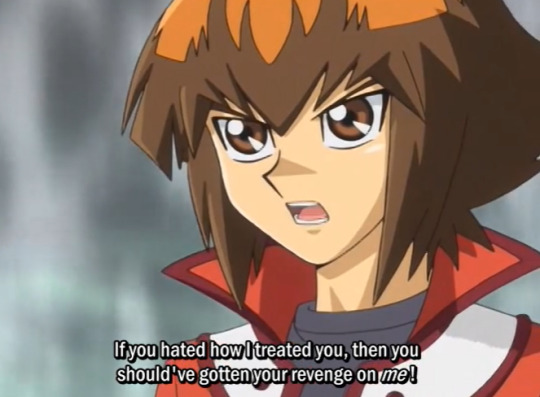
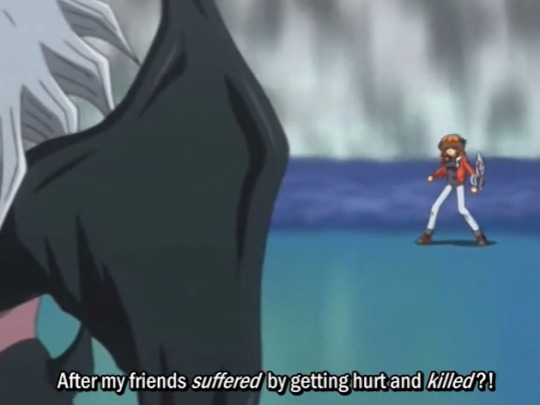
"But then that's the nature of love, isn't it? I wanted all that torment to convey the depth of my love."
Judai rightfully calls out Yubel's involvement of innocent people, but it's hypocrisy on his part. He doesn't have the moral high ground here. Yubel's suffering doesn't entitle them to take out said suffering on Judai's friends, but Judai also slaughtered innocents as the supreme king.
Judai framing Yubel's reaction as revenge is ignoring his own flaws and role in things. Sharing pain = understanding = empathy for Yubel. Yubel wants to be understood, but Judai wants to ignore his shadow.
Yubel's strategy is a kid of forced empathy - to drag Judai down to their level and make Judai understand the same pain so Judai will understand them.
I'm going to quote another post again, this post here.
In her desperation to grasp why she was being made to suffer if Judai loved her, it makes a certain amount of sense that she would latch on to the suffering itself as being something Judai wanted for her. (She knows and admits this isn’t true, btw, but it’s the only thing that allows her even a tenuous grip on sanity) Then, when she was in a position to meet him again, her own views on love would allow her to subconsciously justify making him suffer the same way because her pain had left their life experiences too disparate to form a meaningful connection once more.
And the hilarious thing is that she was ultimately right? Yanking Judai down to her level is what allowed Judai to understand her in a way that was impossible before he had his own little fit of love-induced murder spree.
I think what people sort of miss is that what Judai is reviling her and calling her an unfeeling monster near the beginning of their duel, he’s the one that’s wrong.
This symmetry they eventually reach where they both become perpetrators shows the biggest thing they share in common: trauma, and how they react to it.
Trauma comes to define both Judai and Yubel, but they react in different ways.
Yubel externalizes their trauma, the same trauma Judai hides internally. What Judai conceals, Yubel by acting out their grief on others reveals.
Yubel wears their heart on their sleeve for all intents and purposes. They will act out their pain on others, gleefully, sadistically so. Their entire philosophy of love revolves around the idea that intentionally inflicting pain as a show of love.
However, as stated above that's a coping mechanism. When Yubel says they want to share pain with Judai, it's not revenge, it's a desire for empathy and understanding. Yubel wraps themselves in a blanket of love, to endure years of torture they suffered alone.
Yubel can't just ask for Judai's love though, they demand it.
This too is Yubel shielding themselves, they're coping with their abandonment trauma. Yubel can endure any pain inflicted on them if they convince themselves that Judai still cares, they can crawl out of a crater if it might lead them back to Judai. If Judai rejects them however, they completely fall apart.
Judai too, is protecting himself from fears of abandonment.
Judai's coping method is opposite, he internalizes all his emotions. The pressure of having to constantly rescue his friends, his fears that he can't lose once, or else he'll lose everything. Judai hides it under a smile, and a fun loving attitude.
Judai even states point blank, the reason he always runs forward is because if he stops to think he won't be able to continue. Judai compartmentalizes everything, and it all starts to pile up so high that if he just can't process it.
Judai: I can’t just stay and wait. All this time I’ve run on instinct, never second-guessing myself. If I just stand still now… I’m sure I won’t be able to start running again. And I won’t be able to get to Johan.
Even Judai taking on his friend's burdens, is done out of a fear of being alone. In his backstory Yubel drove all his friends away and it doesn't seem like he made friends until he came to Duel Academia.
Yubel and Judai both spent a significant amount of time alone, and they both fear going back to that time.
When Judai takes on other's burdens, it's a way to protect himself. If he's constantly doing them favors, they have to stick around right? It's still a transactional relationship though, the same way Yubel thinks all of their love entitles them to Judai's love.
Judai's method is to internalize everything. That seems better than Yubel, because Judai's not hurting anybody right? Except Judai's owbmethod of coping turns out to be just as unhealthy as Yubel's.
Judai carries the weight of everyone on his shoulders until he can't.
Judai's fears of being abandoned become a reality.
It's telling that Judai's breaking point isn't Fubuki, Sho, Asuka and Manjoume's apparent deaths. He's deeply upset by it for sure, but what pushes him over the edge is Sho's rejection afterwards.
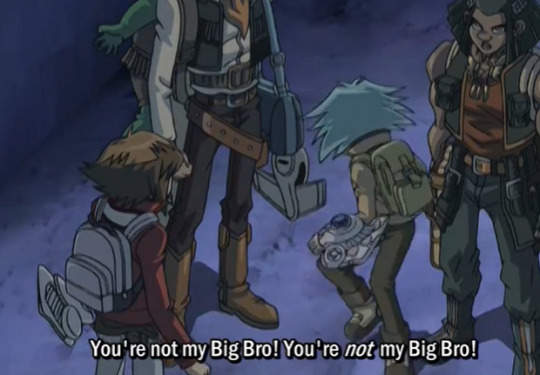
Judai's friends being taken away in circumstances out of his control is one thing, but the fact that Sho leaves him? That Sho sees the part of Judai's self that he's always been hiding and gives up on him. That rejection sends him spiraling, because all along Judai was driven by the same fear of rejection Yubel was.
When Judai reaches his breaking point, he externalizes all the trauma he held within. He starts sacrificing others for power, because he's convinced himself with his friends gone power is what he has left. Judai acts out that trauma on others, as Yubel does with Judai's friends.
In the end Yubel and Judai react the same way to being abandoned, they share the same flaws and the same fears.
Rejecting Yubel, villainizing them, despising them is an act of self-loathing for Judai. However, empathizing with them, understanding, trying to reach out a had to break the painful cycle between them - is Judai accepting himself.
Chemical Wedding
Judai and Yubel become their worst selves when they are alone, they walk parallel journeys in season 3 dragging down Judai to Yubel's level until at last they finally reunite.
This metaphorical union is a chemical wedding, of two opposites coming together. How Judai and Yubel's relationship changes throughout the narrative is vital to how they develop. Their bond develops each of their characters, until they integrate qualities of each other.
The final stage is called a wedding, it's not necessarily romantic but Yubel's 10,000 love confessions can certainly be interpreted that way.
Once again it's not really about what's healthy in a real life relatioship, it's a symbolic journey two characters take in a story. Yu-Gi-Oh Gx uses chemical weddings to develop the romantic relationship between Judai and Yubel.
(What about Bruno - I'll talk about him later next post. Please be patient, I can't cover everything in one post).
Here's another meta on the concept of chemical wedding's in general for a different show. The chemical wedding between Judai and Yubel is woven into the text in may ways.
The show is rife with direct references to alchemical imagery (references to medieval portraits, the solar king and the lunar queen)
A process of death ad rebirth they both undergo multiple times, until their last union where Judai says he might be destroyed by the attempt to fuse with super-poly but he doesn't mind).
The four elements are referenced in the clash between Judai and Yubel, Judai is fire and air - their favorite monster is flame wingman an air and fire hero combined. Yubel is water and earth, their entire deck has a plant motif).
The two of them literally fuse together into someone new. That act is what purifies Yubel's soul by uniting it with Judai, the process of alchemy is purifying metals until they forge gold.
Yubel is also literally a hermaphrodite, and by incorporating Yubel into themselves the two of them together become a hermaphroditic figure.
So that’s the role and importance of the chemical wedding. Pretty vague, right? But over the centuries the most common imagery has been a man and woman--often King Sol/Sulphur and Queen Luna/Mercury--1. standing together, 2. conjoined, or 3. combined into a hermaphroditic figure.
-In the Dictionary of Alchemical Imagery, Lyndy Abraham definition of chemical wedding.
The basic formula of a chemical wedding is the union of opposites (Fire and water, air ad earth, sun and moon, light and dark), that union creating a "Rebis", a figure that is both male and female. Judai and Yubel's journey takes them on a path to uniting as one.
It's a violent sometimes dangerous process as in each step dissolve et coagula occurs, in order to forge your better self you have to let your old self dissolved, which is sometimes a violent even painful process.
It's why Chemical Weddings often take the form of violent conflict. A conflict that threatens to destroy both parties.
The first chemical wedding is usually somewhat violent, primitive even, whereas the second one signifies the creation of the stone. However, characters can have more than two weddings (Hamliet).
Yubel and Judai have three violent confrontations in Season 3, before their final union of opposites take place. The three weddings are the three steps in their journey. It's also a process where both experience several metaphorical deaths, before finally their two souls unite into something new (which is why the ship is called Soulshipping).
SOULSHIPPING WEDDINGS - STAGE ONE
Alchemy is a process of continual death and rebirth. Yubel and Judai both go through two symbolic deaths, (the second one they die together to reforge themselves into something new).
Yubel's first death takes place sometime during season 1 and 2. The satellite containing them finally crashes back to earth, and Yubel burns up upon re-entry. Putrefecation, or Nigredo is the first stage of alchemy a process of boiling away all impurities, and it's associated with the element of fire, and associated with the color black. Yubel's spirit form of a black dragon comes out to protect them, and that burns away too. Nigredo is often signified with the death of a dragon.
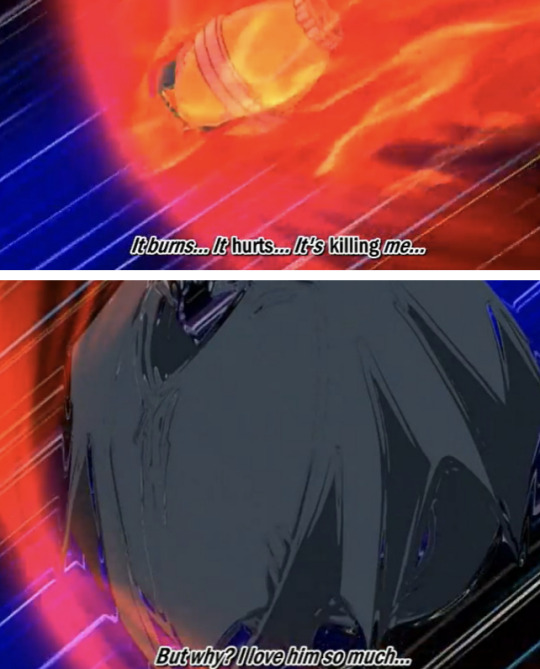
Yubel comes close to death, but their true death is metaphorical.
What Yubel truly experiences is the death of their old self, as the trauma they've endured makes someone new crawl out of the wreckage.
This is the moment onscreen where Yubel snaps and adopts their new philosophy of love, that love is sharing pain with someone else.
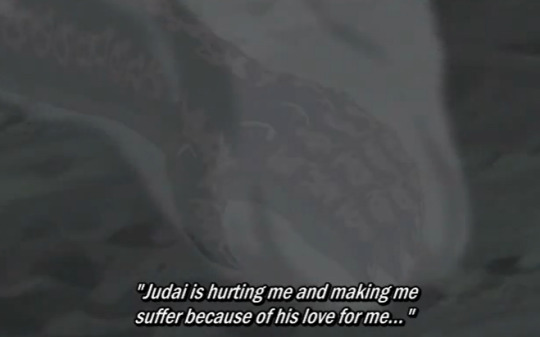
Yubel literally crawls out of earth, out of a crater that could have easily been the sight of their grave. However, their rebirth comes when Yubel reconstitutes themselves in time to meet Judai face to face a second time.
Yubel's true form is revealed then to be that of a rebis.
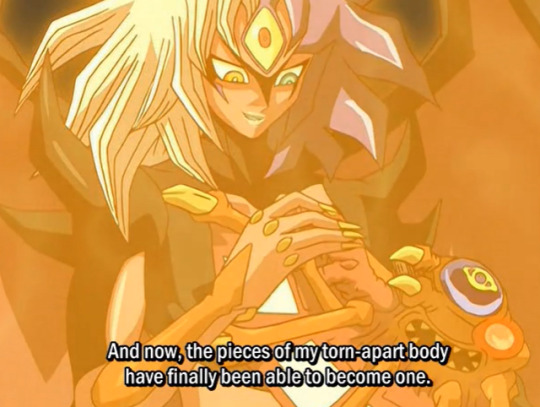
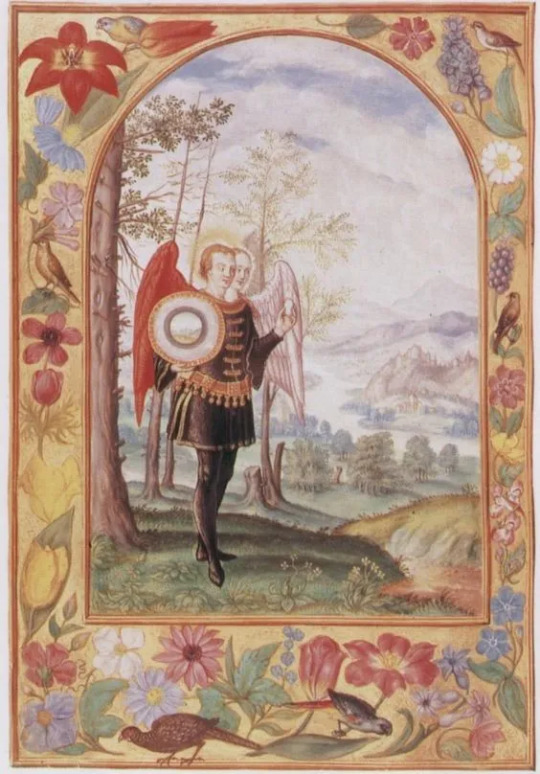
The head on the left is male, the wing attached to his side is red. The head on the right side is female; the wing attached to her side is white and in her hand she holds an egg. This figure is known as the Hermaphrodite, half man and half woman.
Yubel's design is a Rebis, split male and female down the middle. It's even implied in their backstory they were more masculine, and through an alchemical process to become a dragon altered their body to look as such, giving them several feminine traits.
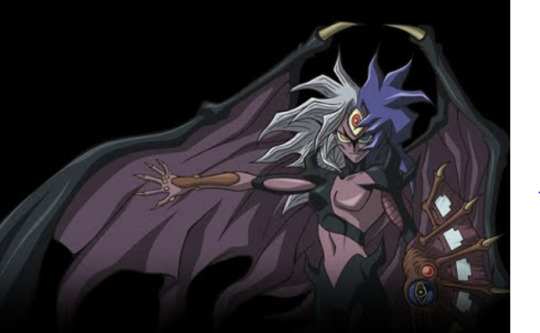
Yubel as one boob and one pec, speaks in two voices a deep masculine one and a light feminine one, defaults to using masculine "ore", but plays a feminine role to comparison Judai's more straighforward masculinity, they even have their face split one side being drawn with eyelashes. The image above is the hermaphrodite and the dragon, Yubel is both.
Yubel can be a reference to the greek story of the hermaphodite or the concept of the Hindu god "Ardanareshwara" which translates to "Lord wo is half woman." Likely both, they have a third eye on their forehead in the place of a bindi in traditional depictions of that god.
Ardanareshwara is the embodiment of the union of male and female energies in the universe, as well as the sacredness of marriage and copulation. [Mythcrafts]
The Splender Solis pictured above are images from the ripley scroll, a in alchemy text. There are 22 plates total, but plates 5-11 are called the parallels they reference the process of death and rebirth.
The seven parables are:
Plate 5 - Miners excavating a hill
Plate 6 - Philosophers beside a tree
Plate 7 - The drowning king
Plate 8 - Resurrection out of the swamp
Plate 9 - Hermaphrodite with an egg
Plate 10 - Severing the head of the king
Plate 11 - The bath
Season 3 goes through all seven, quickly covering the first two plate 5 is mining the Rainbow Dragon out of the side of a mountain, Philosophers beside a tree is Johan's deck using crystal tree, and also Judai awakens after Austin snaps him from his Haou phase underneath a tree.
Judai and Yubel's parallel journeyes reference plates 7-11, #9 was already pictured above.) They both experience two deaths, two rebirths, before their final third union.
Yubel's second death occurs here, at the hands of another dragon (Rainbow dragon is involved).
The first chemical wedding is usually somewhat violent, as metals need to be melted down and reforged through multiple steps in order to create a purer metal.
Judai definitely doesn't want to unite with Yubel their first encounter, they're at each other's throats, in fact Yubel specifically states they want violence, to share as much pain with Judai as possible.
Yubel ends the first wedding literally dissolving gain right in front of Judai's eyes, only to reforge themselves with Johan's body.
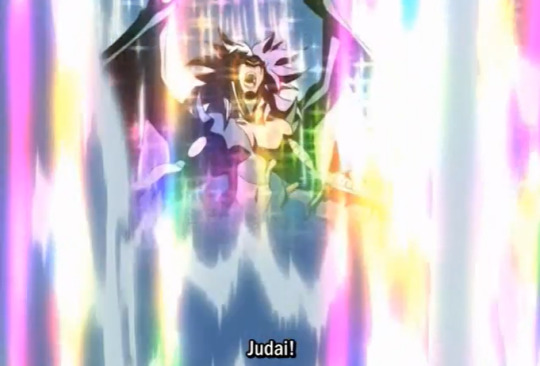
Those are Yubel's two deaths, and Judai's two deaths happen in parallel.
SOULSHIPPING WEDDINGS - STAGE TWO
Yubel is the process of two people breaking down, and mixing until they acquire each other's traits. Yubel pushing Judai down the path of becoming the supreme king, so they can be reunited again is exactly that.
Yubel's plan is to force drag Judai down to their level, so they can be reunited, and at that point Judai having walked a similar path and taken on traits of their can understand them, they tell Judai as much.
So when I solved the riddle you posed I was delighted. ANd that fueled my decision. I would try to fill the entire twelve-dimmension universe with my love towards you, Judai. And once I did, you would have to recognize my loev wouldn't you? That's why I sought to fill all those linked to you, your world, with sadness and anguish.
And my line of thinking wasn't wrong!
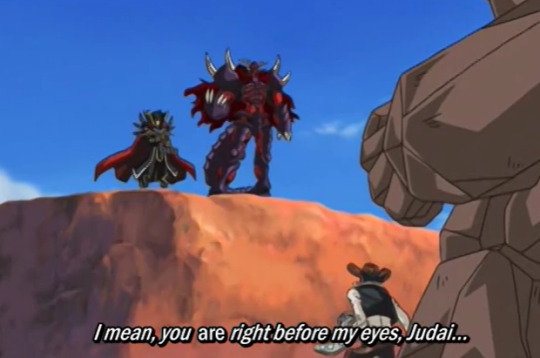
Judai has to go through a process of two deaths mirroring Yubel's own before he can reunite with them in their second wedding. Yubel even says, the first time they dueled didn't work out, because Judai hadn't awakened his darkness of the heart yet. Judai needed to take on Yubel's traits.
Judai's journey to Yubel is referenced by two Splender Solaris plates.
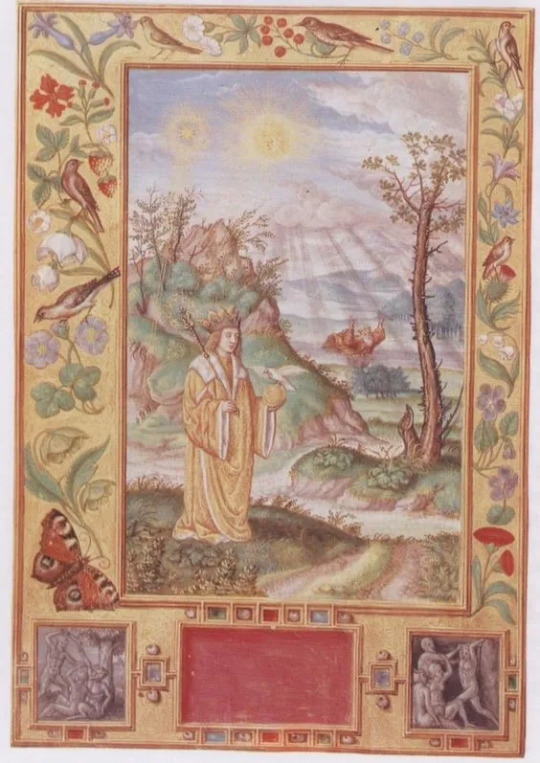
"The destruction of one thing is the birth of another " - Aristotle.
The plate depicts an old king drowning, and a new king being reborn at the same time.
The text describes to us how the old king was taken under, but then reborn the next day from the earth as the new king; the old king must die before the new king is born.
Judai's first death is his breakdown after Sho's rejection, he quite literally experiences a death or self, while at the same time rising up as the supreme king - but it's not a split personality or anything like that, merely an inversion. Judai once internalized their pain, now they externalize like Yubel. Yubel in acquiring darkness of the heart, Judai then begins to take on Yubel's traits, integrating facets of Yubel into themselves.
Within the stages of physical alchemy there is a set referred to as the drowning king; this is the dissolution step of the Nigredo process. This is when the alchemists would take their chemically calcified ashes and dissolve them into water.
Judai experiences the same Nigredo that Yubel does, as his old self dissolves away. Judai sinks into a mental landscape which is pictured as all black, while a new Judai the supreme king assumes his form out of the shadows. The new king has golden eyes, like the new king in the painting is dressed in gold.
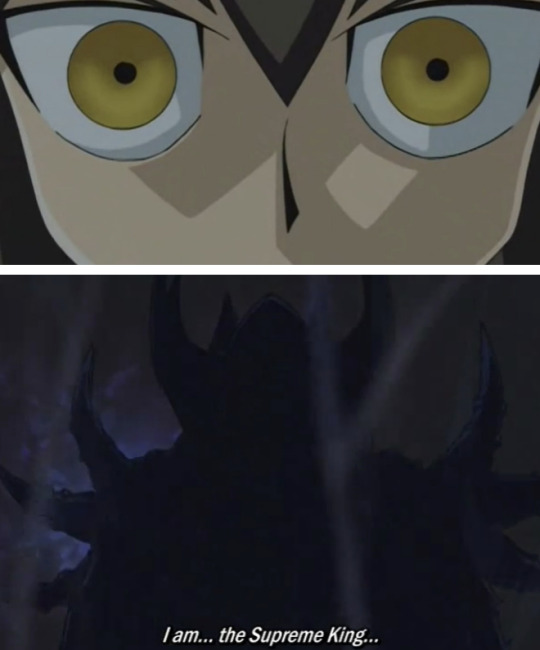
This is where Judai begins taking on parts of Yubel, not only do they lash out at innocent people as Yubel does, don a plate of armor to protect themselves (Judai has black armor, Yubel has impenetrable scales).
It's also a direct parallel to Yubel's experiences. Judai is left alone by the friends who he thought would always take his side and sinks into darkness. Yubel spends years alone in what they call "a capsule of darkness" in space after Judai's abandonment, sinking into denial because Judai couldn't possibly treat them this way when they love them so much.
Judai dies and is replaced by the supreme king, but the supreme king is a just a temporary stage in his development.
In order for Judai to heal he needs to be dismembered first, the Supreme King's head is torn off in a reference to Splendor Solis: Plate 10, severing of the head of the king.
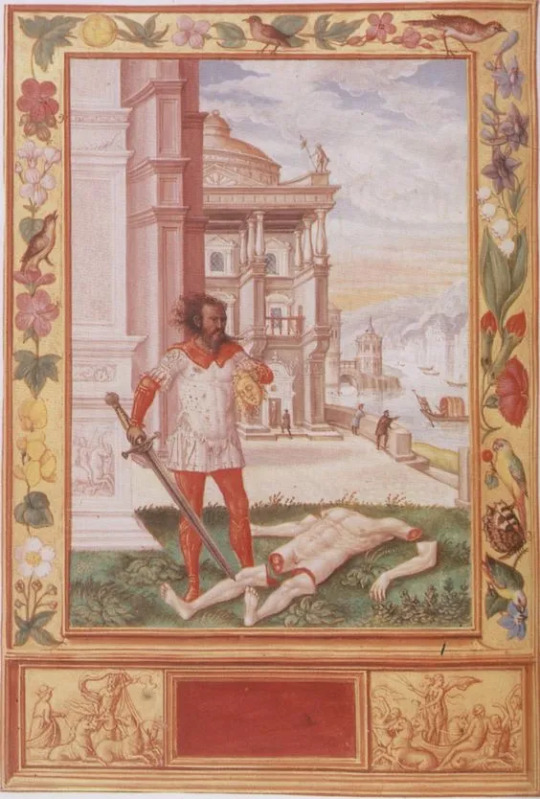
Alchemy is violent; the motto of Solve Et Coagula demands dissolution before rebuilding, tearing apart before putting back together. This idea applies to the material world as well as the spiritual realm; before the psyche can grow, it has to be ripped asunder.
The Supreme King is eventually stopped by Austin, they burn away in in fire, against a duelist with a flame deck, reduced to ash only to rise from the ash reborn like Yubel did out of the crater.
After the end of the duel, Judai's helmet is removed and thrown for all to see to signify the king's dismemberment.
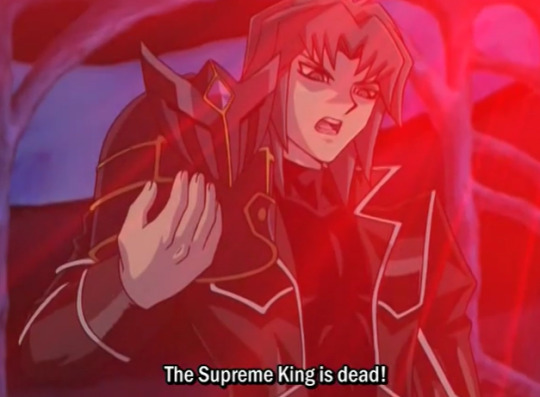
Judai now struggles to become someone new, as he cannot return to his previous state of innocence, but can't keep continuing on as the Supreme King. When Yubel and Judai reunite again Judai has taken on so many of Yubel's traits, they are mirror images of one another.
The second stage of alchemy is albedo, the word is taken from ablutio - the washing away of impurities. When Yubel and Judai meet for a second time, Judai's only priority is to cleanse Johan of Yubel's body, literally through purifying Rainbow Dragon in order to return Johan to his body.
His action in the duel is to destroy the "advanced darkness" field spell which changes Johan's crystal beasts, into darkness crystal beasts. First Nigredo, then Albedo, the prima materia is boiled in a flask where all impurities rise to the surface and make a thick black material, and then those impurities are washed away.
Cleansing Johan's soul doesn't go as intended for Judai however, because the only result is that Yubel reconstitutes themselves for a second time and faces Judai again in their true body.
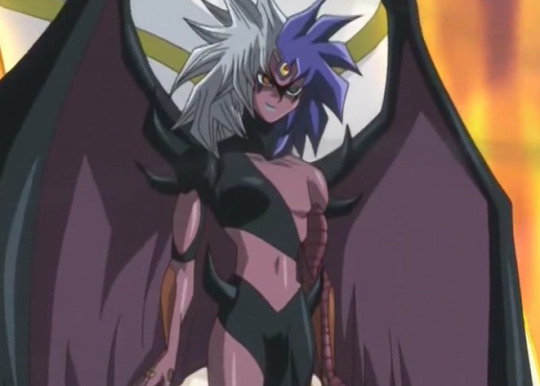
The cleansing turns from Rainbow Dragon from Black to White and both Yubel and Johan are purified into their true selves.At this point they've both experienced multiple deaths, they've both been torn apart and sewn back together again. However, they still have one stage to go.
The duel ends in a draw and they restart another duel facing each other this time, thus beginning the third and final wedding.
SOULSHIPPING WEDDINGS - STAGE THREE
The final wedding in a chemical wedding forges a philosopher's stone, and I bet you can't guess how this third wedding ends.
Everything so far has made use of the death and rebith imagery. Yubel and Judai grow closer each other through a violent union of opposites (extremely violent in this case ). They experience two metaphorical deaths as a part of their journey to finding each other.
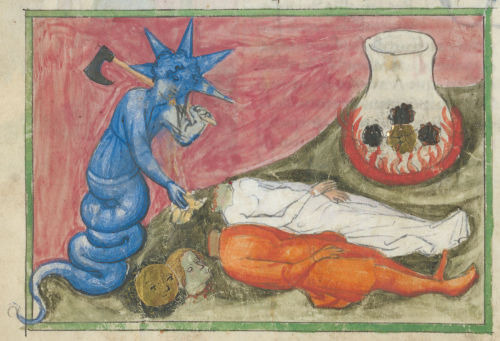
Death and Rebith is a major theme in the last duel, before they both experience their final death together, to become a new being together.
As I said above they've experienced several violent deaths, Yubel is ripped to pieces until they're nothing more than an arm, Judai experiences an ego death and reforms as the supreme king, before the supreme king's armor is torn off him.
In the third duel Yubel's signature monster experiences two deaths, only to be reborn again into stronger forms, yubel terror incarnate, and yubel the ultimate nightmare.
Yubel starts as a one headed dragon, their second form has two heads, their third they fuse with the dragon becoming the third head representing the three stages of alchemy. In the picture above the red, white and blue signify those three stages as well.
Judai and Yubel are also positioned as the Solar King, and Lunar Queen in their duel, just as in the alchemy painting above.
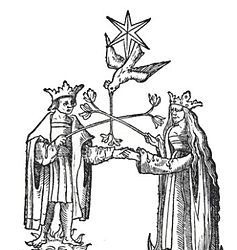
The above image image is taken from is called Rosarium Philosophorum–which literally means “rose garden philosophy. In this case I believe the anime writers are deliberately reference the "rose garden philosophy" name b/c even Yusei and Aki in 5Ds have a similar duel in a Rose Garden that parallels this duel - representing their union of opposites too.
The final duel between Judai and Yubel takes place in a rose garden, intentionally so. Yubel uses two rose themed cards, and their method of attacking and sharing pain nightmare pain revolves around lashing out with a vine covered in rose thorns.
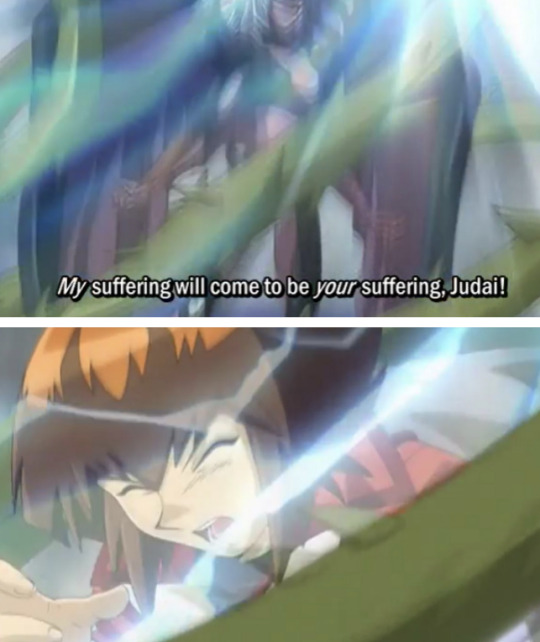
They're both entangled in the rose garden together, as Yubel says my suffering will become your suffering, Judai. Yubel isn't immune to pain they suffer alongside him, for Judai hurtng Yubel is an act of hurting himself. That's also a reference to the ouroboros, the snake biting it's own tail is a common symbol associated with initiating the alchemical process.
Judai has taken so many traits of Yubel at this point they are inseparably intertwined, there's no telling where Judai ends and Yubel begins so any damage Judai attempts to do is dealt to himself as well.
Standing together in the garden Judai assumes the role of the solar king, and Yubel the lunar queen.
Yubel's machinations were to make Judai ascend into a king, Judai is referred to as being like the sun by Sho drawing everyone in. Yubel is the moon which orbits around Judai. Once again Judai is fire, and Yubel is mainly plant themed. Judai assumes a masculine role, Yubel after transforming into a Rebis changed their body to take on feminine traits. Judai is the holder of the gentle darkness, Yubel is corrupted by the light of destruction which is engaged in a battle with the gentle darkness.
Theirs is a violent union of opposites, they are literally trying their best to kill each other.
Yubel frames themself as the selfless protector of Judai like a knight or servant, but their obvious desire is to stand together with Judai and be on the same level with him (hence dragging him down).
They spend a duel against Amon reviling him for how easy Amon could throw Echo away, because ultimately Amon is the king, and therefore Echo is beneath him. In fact Yubel was content to just sacrifice their body like Echo and serve as a protector in a previous life, until prince Judai offered Yubel their eternal love, giving something in return and elevating to them as equals.
So Yubel's primary goal is to be by his side, to be lunar queen to his solar king.
In order to accomplish this the art depicted above has to happen, they both have to dissolve, experience a death and become something new together.
Judai even explicitly tries very hard to kill Yubel, saying they'll use the power of the supreme king to erase them from the universe. Yubel similarly, rejected one too many times responds to violence with violence. Their union is inherently marked by violence. However, it's what brings them to a closer understanding of each other.
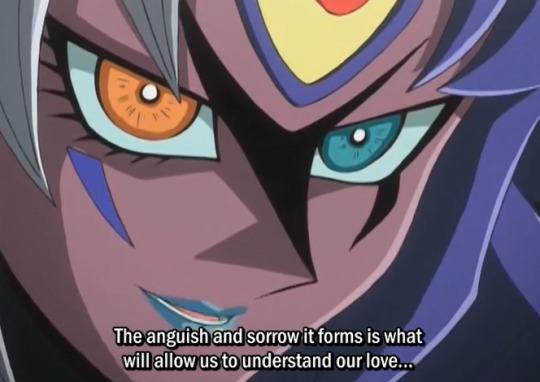
However, while violence brings them closer together, it eventually has to transform into a a union.
As they reach the final stages of the duel, Yubel states to Judai they finally understand that Judai has chosen to respond to all of their love with hate (once again union of opposites, love and hate). At the same time a wind begins to blow, elemental symbolism occurs as the wind and clouds appear in a process of "sublimation", and Judai's past is revealed to him, and he realizes his memory of his past life of the Supreme King.
Sublimate appears as a term for a mineral deposit, by analogy to the alchemical process: minerals in a vapor state, thrown up from the interior of the earth.
The introductory of the element of air also signifies Yubel and Judai moving from Citrinatis, the yellowing, signified by earth to Rubedo the final stage where the philosopher's stone is forged. Judai and Yubel's first duel takes place in a desert (earth), their second they climb high into the sky, and their third they climb even higher until they are standing above the clouds fighting in an arena of air.
Sublimation is a whole new experience of self and reality, both being redefined. Judai's reconciliation isn't just Yubel, it's with the three faces of himself Prince Judai, Regular Judai, and Haou / Supreme King. These memories lead to Judai's eventual decision, to propose a union. This union takes place as the last chemical wedding, which is also a real wedding in everything but name.
Their entire duel contains elements from both japanese and jewish weddings (the three phantasms that Yubel utilizes in the duel against amon are based off of three kabbalistic angels so the jewish symbolism has already been used before).
A traditional Jewish wedding starts with drawing up a marriage contract (Spell Chronicle), and the bride paying out a dowry (the five cards Yubel banishes at the start of the duel). The wedding must be observed by a minimum of two witnesses (Shou and Ojama Yellow). During the wedding the bride circles the groom seven times (Yubel makes 7 successful attacks on Judai between their 3 forms, all others were negated in some way). At the end of the ceremony, the groom presents the bride with a ring (Judai giving Yubel Super Fusion), and a glass is broken to the cry of “Mazel tov!” (the glass window breaking in Samejima’s office). Finally the ceremony isn’t considered complete until the bride and groom retire away from everyone to ... consumate the marriage (Judai and Yubel leaving together).
Source [HERE]
Judai attempts to use super polymerization card to start the process of alchemy (fusing the 12 dimmensions - there are 12 steps to Alchemy). However, Judai announces that the two of them are going to fuse together.
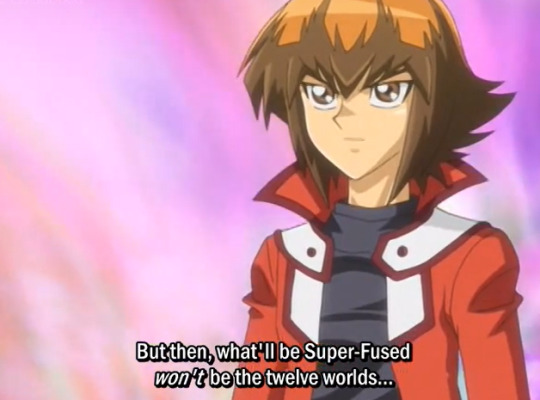
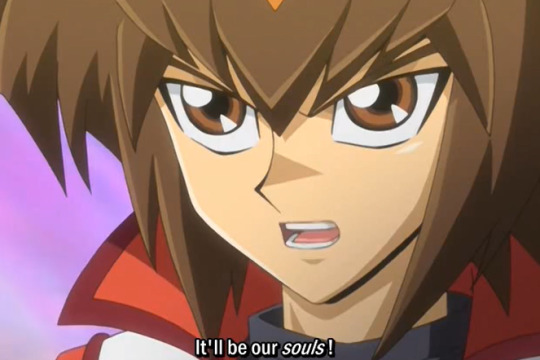
Judai and Yubel's quite literal fusion into one being is the formation of a hermaphrodite. From the essay of "Get your Gender On, Jaden Yuki and Yubel",
Art historian Arturo Schwarz argues that “the Great Work is but a metaphor” in which alchemists don’t create a Rebis but become a metaphorical Rebis themselves, as Judai does over the course of the series. By joining his soul with Yubel’s through “Super Polymerization,” he arguably becomes nonbinary like them. Even before literally fusing with Yubel, he gains “aurea apprehensio (golden awareness) of this marvelous reality: we are gods, because we all are man and woman at one and the same time.”
Hermaphordadites are a recurring symbol in a lot of greek mythology, the name comes from Hermaprhoditus a son of Hermes and aprhodite originally born male. A female nymph fell in love swam to him in a pool and wound herself tightly around his body and begged the gods to never tear them apart creating the co-joined male and female figure the hermaphrodite. The parallels to Yubel and Judai are present, especially in them becoming entangled in one another.
One origin story for humanity is also that human beings were originally two headed, four armed, and four legged beings, combination of men and women, men and men, and women and women. However, they were torn apart into two seperate beings, and forever doomed to go searching and be reunited with their second half.
When opposites are finally reconciled, the great hermaphrodite is formed. Judai even refers to this as an act of finally purifying the light's corruption from Yubel's soul by uniting it with the supreme king's soul. The union is a purifying process, and the end of Yubel and Judai's long journey of losing each other and finding each other again.
However, in order to be purified they have to both let their old selves die in order to form something new, the final death but one they experience together. Just like the painting of the dismemberment of the solar king and lunar queen, they need to be torn apart and sewn back together again.
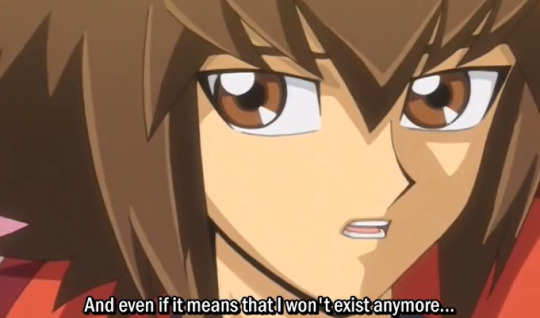
I don't care.
Yubel is finally moved, and all the anger between them is washed away by tears as they're finally allowed to grieve (as death is central to alchemy, so is grief, both are parts of life).
To signify the end of this journey, Judai falls to earth the same way Yubel did at the start of their story. However, while Yubel was suffering, all alone, this time Judai and Yubel are together.
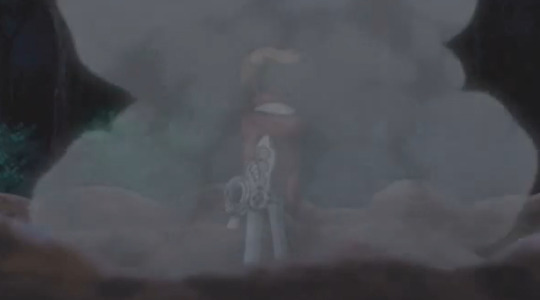
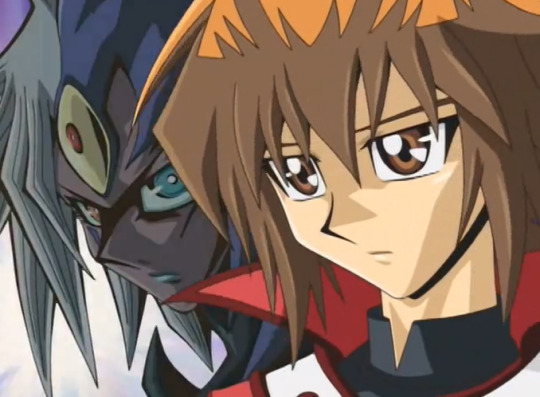
#alchemy#yugioh#yu gi oh gx#judai yuki#yubel#soulshipping#jaden yuki#yu-gi-oh gx#yu gi oh gx meta#ygx meta#they're gay#ygo is to splendor solis what rwby is to ripley scrolls
41 notes
·
View notes
Note
finished part 3 of demons....no words honestly. i'd like to hear your thoughts on Stavrogin's end in relation to Raskolnikov for example and why you think Dostoevsky had two different ends for two of his "main characters". Also I've had this thought since I started reading, about how Stavrogin reminded me of Johan from Monster, and also wondered if you had ever made that connection yourself and if there's any merit to it, ty again for the answers!
Yeah. Yeah. Lol.
Stavrogin and Raskolnikov
Raskolnikov looks for meaning via believing himself somehow better than society; it's an inwards-->outwards type thing. Stavrogin is the opposite. Society determines that he's somehow better than they are because he's blessed with good looks, intelligence, likable, an outwards-->inwards type thing.
The main idea of Demons is of course that if you become obsessed with an idea, any ideology at all, it can consume you and turn you into a demon. This is explored to a degree in Raskolnikov's character, too. Yet at the same time as this is true, being empty, with no ideology at all, only leads to being filled sevenfold with demons.
Stavrogin is the empty one.
Svidrigailov, Stavrogin, and Raskolnikov
Raskolnikov (and Svidrigailov) have a tendency to see other people as tools. Raskolnikov, however, acknowledges the humanity of Sonia, of the Marmeladov family, of Razumikhin and Dunya and his mother. Svid... doesn't acknowledge others as people with their own wishes and dreams, as I've mentioned before.
Stavrogin also doesn't acknowledge this about others, not really. There are similarities in how he views Dasha and how Svidrigailov views Dunya, but there are also extreme differences.
Svidrigailov wants a Good Girl to redeem him, but doesn't realize that comes from acknowledging humanity in yourself and in others. He wants to die when he realizes that he will never be loved by this one person he's made into an idol of goodness and beauty.
Stavrogin has numerous Good Girls who are willing to risk their reputations to help him. Liza runs off from her genuinely good fiance for him, he marries a mentally ill woman (Marfa), he has Dasha the servant girl risk her reputation to be his confidant (and frankly, he seems to only be able to trust her). Marfa is murdered and he lets it happen despite it not being his wish, Liza also gets murdered because of her dalliance with him, and Dasha survives but sees his suicide. He also has a child with Shatov's wife, has Kirillov who is kind, has a mother who loves him, a tutor who believes in him, and a revolutionary friend who loves him.
Yet none of that saves him, because Stavrogin cannot acknowledge his own humanity and so cannot acknowledge that in others, and no one around him acknowledges his humanity either. They all see him as something above them--with the exception of perhaps Dasha. But her acknowledging his humanity isn't enough to save him. So he sins and sins worse and worse hoping to feel something, but never does. And if he can't feel anything, is he truly human?
The irony, of course, is that he's painfully human. He's ashamed of what he's done to a degree, even, because he refuses to allow society to find out about all he's done. In other words, there's an aspect of Stavrogin that resists the idea of people seeing him as human. And isn't that somehow paradoxically human, to want to be a god and have the world go according to how you want it to?
I do think this aspect of feeling inhuman is similar to Johan, though I think Johan is ultimately more similar to other characters like Ivan or Smerdyakov, or even Raskolnikov, than to Stavrogin. Johan does face humanity in the end, after all.
NB:
I also think it's worth noting that characters who have sexually abused children never get happy endings in Dostoyevsky's works. They have the chance to, they are human, but they never do, and that probably reflects an aspect of Dostoyevsky's trauma and limits, which is frankly relatable.
#ask hamliet#nikolai stavrogin#demons#fyodor dostoevsky#crime and punishment#rodion romanovich raskolnikov#svidrigailov#tw
5 notes
·
View notes
Note
what do you mean that if you try to please everyone you please no one?
It's the same principle as like... say you're having a party for your birthday and you want an ice cream party. You can only buy the amount of one tub, but that tub can fit a few different flavors and even mix a few. If you try to buy every flavor under the sun in a single scoop and mix it all together, I guarantee you no one is going to like it because it will taste awful. But if you buy a few different kinds, some people won't get their favorites.
Sometimes, that's just how life goes. Stories are like this too.
I think Hori sometimes writes for his detractors, which is a poor way to support a theme. It's like he tries to address all the criticism he sees of the abuse plotlines in particular (probably because he genuinely cares a LOT about this; Idk about you but when an issue is personal, it's really hurtful to have people saying you are excusing abuse or something). But in doing that, he waters down the themes he's going for and it becomes messy and confusing insofar as the story's "flavor" (theme/message) is concerned.
Sometimes it's better to accept you can't save everyone or please everyone. Do what you can with the tools you have. He has the talent and the writing ability to write a compelling redemption story and even a wish-fulfillment reconciliation story of an abusive family. Many won't like it. Some may even be offended. But those are the tools he has, and I'd rather he write that than try to convince people who were already against the redemption of Shigaraki that no, they really have to root for it, or that Enji wasn't really that bad.
24 notes
·
View notes
Note
Hey I’m the svirdgailov anon from a while ago, about halfway through demons, just read stavrogins confession and man this story is just incredible, you were right about thinking I’d like stavrogin. You’ve had plenty of responses about kirillov and pyotr, not sure if you’ve talked about the at tikhons chapter, maybe I should wait till I finish the story before sending this ask but I’d like to know ur opinion on the chapter itself. To me it’s the best chapter I’ve read from Dostoevsky besides the c&p epilogue so just wondering . Ty in advance
Also off topic question but have u read the eternal husband? I found that story really interesting too and I see quite literally no one talk about it, the double gets talked about more somehow, I think it’s so underrated .
Hiiii!!!! I'm so glad to read this, because Stavrogin is definitely inspired from a lot of the ideas Dostoyevsky used to explore Svidrigailov.
I have read The Eternal Husband, but it was probably ten years ago. I must reread it. I do remember really liking it.
I do think "At Tikhon's" is masterful, but since you're not finished yet I'll talk about the chapter outside of the novel and its context... when you finish the novel, do come back and ask again!
I'm not sure if you were aware of this, but the chapter was actually censored originally and not allowed to be published. See, back in the day, novels were serialized like manga chapters today in that they were published in regularly-scheduled magazines chapter by chapter. "At Tikhon's" was not allowed to be published because of the disturbing nature of its content, and so has been added to Demons as an appendix, or in some modern versions, slotted in where it was intended to be included in the novel.
I think the chapter is vital to understanding the story and to Stavrogin's character, and one that asks moral questions of not just Stavrogin and everyone who seems to care about him, but also of us as readers. It's a truly disturbing and unsettling chapter. It's triggering as hell and hard to read, but ultimately the novel is more powerful for its inclusion--it's not at all gratuitous, but it should upset readers.
However, because of its rejection, Dostoyevsky had to resort to other ways to show Stavrogin's characterization. This has led to some critics thinking the chapter is ultimately irrelevant to Stavrogin's character, but I think this is a take fast fading with time. Most modern critics regard it as essential, and I would also consider it necessary to understand his character.
Again, to go back to the "outside the novel" idea, this chapter, along with Svidrigailov's character, that of Fyodor Karamazov in The Brothers Karamazov, and Totsky in The Idiot, all have an extremely similar sin in common: basically, rotten men who sexually abuse young women, and how society responds to these crimes--or doesn't. All but Fyodor's were preteens/young teens, and Fyodor's victim was seriously mentally disabled. The reason Dostoyevsky includes this in a lot of his works is because one of his formative childhood memories is of a girl about his age arriving for help from Dostoyevsky's father, who was a doctor. The girl had been assaulted, and it clearly traumatized Dostoyesvky. There's a reason his works always touch on the question Ivan Karamazov poses right before delving into The Grand Inquisitor: "but what of the children?"
4 notes
·
View notes
Text
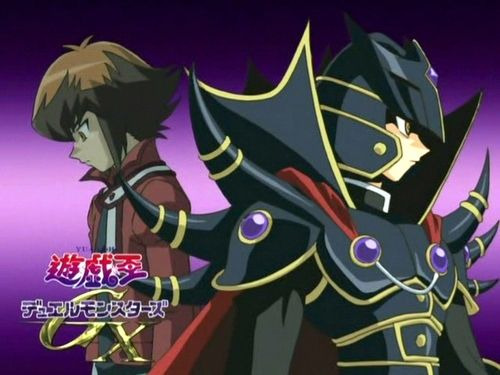

The Supreme King Judai vs. Dark Deku: How To Do a Dark Deconstruction of your Shonen Hero!
Think of this as less me complaining about My Hero Academia, and more me taking a closer look at the writing of the Dark Deku arc and why it failed to achieve what it set out to achieve.
I like to look at writing on a deeper level than Thing Bad, and Thing Good. Imagine a story is a car engine that won't start, in order to find the problem you've got to disassemble all the pieces and look at them one by one to see what pieces aren't working. That's the kind of criticism I'm talking about, break storytelling down into different tools like parts of an engine, plot, world, characterization, ideas, actions and consequences and then look if the author is using those tools effectively to sell a story.
In other words we're talking about the difference in ideas and execution. All works of fiction have ideas, even bad anime can have good ideas inside of it. The idea in question is Judai's case is can exploring the dark side of a hero. Can a hero's positive qualities also lead them down a dark path? Yu-Gi-Oh Gx answers this in a satisfying way, and My Hero Academia I'm going to argue does not.
IDEAS VS EXECUTION
One piece of writing advice I heard from Brandon Sanderson of all people that always stuck with me is "Ideas are cheap. You can always come up with more ideas."
All works of fiction have ideas and themes no matter what the Game of Thrones guy say, but some works are better at communicating their ideas than others. I want to quote a Homestuck Ending analysis of all things to explain what I'm talking about.
When you are a writer you can write anything you want. But if you want to write a story that people want to read you have to follow the rules of good storytelling.
There are reasons why storytelling rules exist. A story is a bond between author and reader, readers to other readers. It is a communication between humans and humans work in a certain way.
Storytelling rules are rules of communication. Rules for handling expectations and saying what you intend to say without it being misheard. Rules for tugging at emotions and pulling heartstrings in a good way rather than a bad way. Storytelling rules are lessons learned by authors of the past that failed to communicate what they needed to. They are not that subjective.
Chief among these rules is buildup and payoff. In fact one of the most basic techniques of storytelling is foreshadowing, in screenplays you usually foreshadow one important twist, then add a reminder so the audience doesn't forget, before finally paying it off.
To simplify build up and pay off I like to refer to it as question and answer. Usually a story will ask its audience a question, and usually by the end that question is answered, unless the point is to leave that question unanswered / ambiguous.
Character arcs are examples of buildup and payoff too, a lot of characters, especially in serialized media are sold on their potential future development. Here's an example, how may people got invested in Dabi years in advance because of the Dabi is a Todoroki Theory? That's an example of good buildup and payoff, because the author sewed just enough hints to build up an audience expectation and then paid it off. People became invested in the story, because they thought their investment and theories would pay off eventually and it did - so hooray!
Both MHA and YGOGX dedicate an entire arc to trying to deconstruct their main protagonist. They also seek to deconstruct the "Hero Complex" or "Saving People Complex" that each protagonist has, and ask the question if those traits are really a good thing.
This post puts it better than me so I'm going to quote tumblr user rhodanum.
‘Hero complex’ or 'saving people complex’ — an obsession with rescuing people in the face of danger, often to the exclusion of all higher thought processes. All too prevalent among shounen main leads, especially hot-blooded shounen main leads. Yuki Judai is certainly no exception. What is interesting in his case is that the writers follow the consequences of his rash, reckless, often thoughtless actions all the way to their heartbreaking logical conclusion.
For those not fully in the know, it involves spiky black armor, an army of sycophants and a fall from grace that caused as much damage as a thermonuclear bomb. Don’t make perky, happy shounen protagonists snap, people. First rule.
I'm going to quote another video too, to add onto the above quote. It's from this video, starting at around 39:52
"GX is kind of famous among fans for taking its happy protagonist and stripping him down to all of his worst qualities. And that's fun. So Judai is a character who's really interesting. He's definitely open to a lot of interpretation, and you know we're gonna be leaning on my interpretation of him. Sorry. It's my video. I think he's commonly referred to a "very typical shonen protag" probably one of the most shonen protag of the yu gi oh protagonists. He is headstrong and loud, and (makes punching noises while air boxing), he is a type of character who's like I'm gonna be the best and brings everyone along on the ride. He's the kind of protagonist that everybody loves him they're all fighting over him, and Yu Gi Oh Gx really puts him up on the pedestal, of like THIS GUY. THIS GUY DOES IT ALL. Then season 3 rolls around and dares to ask: but what if that's selfish behavior?"
That's the question both MHA and YGOGX are asking in Dark Deku arc and Season 3 respectively, what if all of those behaviors that make them the typical hot blooded shonen protagonist are actually selfish? Is their hero complex really a good thing?
Each arc is tasked with exploiting the main character's flaws, until they reach their emotional breaking point and lowest point in the story. Let's see how each story treats their main character and from comparing that I want to make a point about what makes effective storytelling.
The Supreme King Haou Arc
Instead of recapping the entire arc to you, I'm going to touch upon what ideas the story setup in regards to Judai's character and how it paid off those ideas. What are the questions the story asks and what answers does it give us?
I'm going to focus on the two questions I outlined above. Is their hero complex a good thing? and What if this is selfish behavior?
Yu-Gi-Oh GX is an anime where instead of using super powers, the main characters fight each other with a magical trading card game. Besides that fact there's a lot of similarities between GX and MHA. They both take place in an academy setting where the main characters learn about using their quirks, and playing the card game better respectively. It is a shonen battle anime where almost everything is solved with a shonen fight, they just use cards instead of flashy superpowers. The main characters are all students who have to grow up and enter the adult world.
Judai and Deku are both characters that deconstruct the "hero complex" of shonen main characters. Judai is themed entirely around heroes, he has an elemental hero deck where every hero is based off a hero that appears in popular culture, he is the best duelist in the school and the one everyone calls on to save the day over and over again. As stated above he is the most Shonen Protag to ever Shonen Protag, he's a warrior therapist who makes friends and saves the day because he's really good at the card game, and will always show up to fight for his friends.
For the first two seasons Judai is built up on this pedestal of the ideal Shonen Protagonist, and praised by basically every single character for being "childish" and "pure of heart" however when Season 3 comes around the narrative stops heaping endless praise on him and starts to challenge him. However, this doesn't come from nowhere there are signs of these personality flaws of Judai, they just get swept under the rug the first two seasons.
There are several moments such as the climaxes to season 1 and season 2 where Judai fails to grasp the stakes of the situation, saying things like "Oh, this card game is really fun" when he's dueling with lives on the line. Judai in fact has a pattern of "only wanting to duel for fun", he fights because it's fun to him not because it's the right thing to do. However, he's continually forced into high stakes situation where he has to fight for others just because he's the strongest character - and constantly having to carry that on his shoulders starts to weigh on him after awhile. Judai will show up to fight and save his friends every single time they need him, and that's the source of his hero complex because after a certain point his friends start relying on him too much.
In general he also doesn't have deep thoughts of what heroes are, he admires heroes but it basically boils down do "Heroes are cool." He's kind of like Goku where he doesn't really fight for any idea of justice or to save others, just for the thrill of fighting itself. He also has a tendency to be insensitive to other people's feelings and take things for granted. For example, in Season 2 like three of his friends get possessed and Judai doesn't even do anything about it for half a season because he's too busy participating in the dueling tournament.
In general though it's a pattern of Judai only wanting to "duel for fun" and him being forced to duel to save others instead, and be responsible for other people. Judai will show up to fight for his friends, but even then he falls back on just "dueling for fun" because always having to fight for others is too much responsibility to put on his shoulders.
There's a lot of hints of Judai's flaws, but they also tend to get brushed off because shonen protagonists are just like that. Like, Judai can say some insensitive things to his friends sometimes and be oblivious to their feelings, well he's just a book dumb shonen protagonist. Judai should be taking this fight seriously, well he's just being a happy go lucky shonen protagonist, etc. etc. A lot of these things are also just swept under the rug as him just being a child, a boy-at-heart like most shonen protagonists are supposed to be.
However, season 3 starts looking at Judai not as a shonen protagonist but as a person, and it all starts with the suggestion that maybe Judai remaining a child at heart is a bad thing, especially when his friends around him are all growing up. It all starts with the introduction of this guy right here - Johan Anderson.
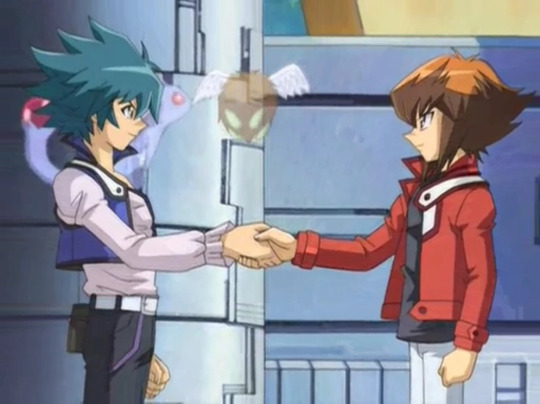
Johan shares many things in common with Judai, he can see spirits, he's a duelist who loves to duel, he has a strong connection with his cards. However, the more you compare them the more you notice that Johan has a lot of things that Judai lacks. They are so similiar that they become almost instant best friends, but even then Johan himself notices there are a few things off about Judai's behavior.
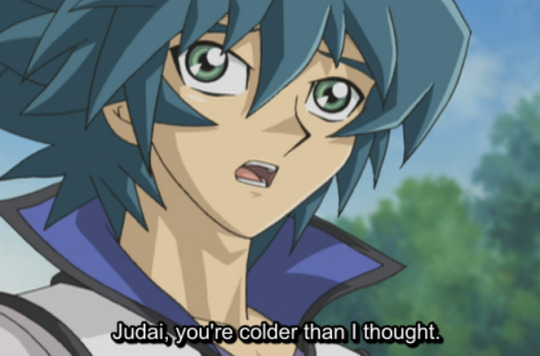
Sho: Bro... I thought you would have something to say to me.
Johan: He seems lost. I think he just wanted you to give him some advice.
Judai: SHo will be fine.
Johan: Judai, you're colder than I thought.
It takes someone completely new to the dynamic between Judai and his friends, who likes Judai but hasn't spent the past two seasons idolizing him to realize that some of his behaviors are kind of off. That Judai isn't really the most empathic, or even that good at understanding other's feelings.
Johan is the one to point this out because he has the emotional intelligence that Judai lacks. We've been told Judai is our shonen protagonist for two seasons, only for the real shonen protag Johan to step up out of nowhere and show them how it's done. Johan is good at seeing other people's emotions, and he becomes a near instant pillar of emotional support for Judai. More than that, he also is the first person to treat Judai like an equal, he never asks Judai to save him like all of Judai's friends do, if anything they both save each other.
Johan also exists to show what Judai is lacking, mainly a reason behind why he fights.

Judai: I do it because it's fun. Or because of the surprise and delight, I guess. Well, I guess that comes down to "because it's fun", huh? Sorry, I guess that's an awkward question to ask out of nowhere.
Johan: What's wrong, Juadi?
Judai: Nothing, really.
Johan: I have a proper goal.
Judai: Don't tell anyone. Even if people don't have the power to see spirits, they can still commune with them. That's why, for those people as well... (I want to be a bridge between humans and spirits).
Judai is someone who will always show up to save his friends when he is asked, but he doesn't really have a concept of what being a hero is or the repsonsibilities it entails, he just admires heroes in a pure hearted way. Johan on the other hand has a reason to fight and that's to help humans and card spirits get along, and Judai expresses admiration for Johan because he has a goal.
At the same time this is happening, Judai gets picked apart by two villains for his lack of reason for fighting. Judai has been praised to death for two seasons for being pure of heart, but now the villains are challenging him by saying he has no "darkness of the heart". That without it the reasons that Judai fights are superficial and frivolous.
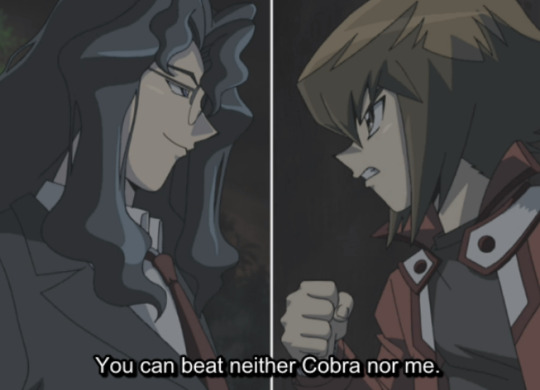
We have something that you lack.
Judai: That I lack?
Yes the darkness of the heart that slumbers deep within a duelist. The burden that a duelist bears in his heart. Judai, you have none of that.
Judai: A burden in my heart.
I have nver, not even once, dueled for myself. I doubt someone like you, who only thinks of himself could udnerstand that.
Judai: What would be fun about a duel like that?
It isn't fun at all! You must bear other's expectations while remaining strong. That is what it means.
Judai is a bit of a blood knight, he will be dueling with his friends lives on the lines and stop to go "Wow, this duel is really fun" and it's usually just dismissed a shim being a shonen protagonist until suddenly it isn't.
I'm gonna draw a deliberate parallel between Deku and Judai here that I'll reference later on, they both don't understand "darkness of the heart" and they need to understand it in order to grow as people.
There's also the underlying notion that being a hero is not all it's chalked up to be, to be a hero, to fight for other people's sake means also taking on their suffering. As noble as that may seem suffering is suffering.

Cobra: Fortune would never smile on a fool like you who fights while prattling on about enjoying duels.
Cobra: You are certainly a talented duelist. But you have one fatal flaw.
Judai: A fatal flaw?
Cobra: Yes, your duels are superficial. Someone who fights with nothing on his shoulders, cannot recover once he loses his enjoyment. What a duelist carries on his shoulders will become the power that supports him when he's up against the wall!
Cobra: But you have nothing like that! Those who go through life without anything like that cannot possibly seize victory.
Cobra: But I know that nothing I say will resonate with you... because you have nothing to lose but the match.
Judai: I...
Cobra: Afraid aren't you? Right now, you have nothing to support you.
In the context of this scene, Cobra has told everyone that he's currently enacting his evil plan out of the vain hope that he can somehow revive his son from the dead.
As insane as "I think I can revive the dead" is as a motivation, fighting for the sake of your dead son is a much stronger motivation than "I think duels are fun."
Judai doesn't have an appropriate answer as to why he fights when he's questioned by the villains, and instead of coming up with his own answer he relies on the answer Johan provided for him.
Johan: You idiot. Why are you so shaken Judai? You think you have nothing on your shoulders? Give me a break! You always bear other's expectations on your shoulders. When you have other people's expectations riding on you, it means they've trusted you with their hopes! Don't you always carry those? If you lose what will happen to us here?
Johan's words snap him out of it, but this isn't Judai coming up with an answer himself it's just taking the one that's provided for him.
This is also the point where we get start to develop an answer to our question. Is Judai selfish?
In action he's not. His actions are selfless. Judai is always fighting for others, even when he only wants to duel for fun. He will show up and fight if you ask him too.
However, in motivation he is selfish. His motivations are selfish. Judai isn't fighting out of some selflessness, but because fighting for the sake of other people gives him a purpose. He keeps fighting for his friends, because he's built all of his friendships around being the one to solve their problems. It's why he Johan's answer suits Judai so well, because he thinks that's how friendship works that he has to keep carrying everyone's burden for them.
Not only does it lead to unhealthy friendships (he sees his friends as burdens) but also it's unhealthy for Judai himself (he can't keep carrying other people's burdens without getting weighed down).
Judai's hero complex, this pressure he feels to save everyone around him arises from two things, it gives him friends when he'd been a lonely child before that, and it gives him purpose. Playing the hero is how he made all of his friends, and now it's how he keeps them.
However, in spite of doing all this to keep his friends, Judai's relationship with his friends is so all give and no take that he's practically fighting alone until Johan shows up. Judai doesn't form a healthy and stable relationship with Johan however, Johan just becomes a crutch.
In Summary:
Judai's actions are selfless.
His motivations are selfish.
Judai's purpose is to carry everyone's burdens on his shoulders.
Judai's friends exist to be saved by him.
The following arc is roughly divided into four sections. Everything I've covered above happens in the first section the Cobra Arc.
Cobra Arc
Zombie Survival Arc
Dark World / Supreme King Arc
Oh Shit, Yubel's Back
The cobra arc is the introduction and it sets up the basic ideas of Judai's character that I listed above, in addition it focuses on the question of if Judai is selfish, and the idea that being a hero is a burden. There's also the third question where Judai is called to understand darkness of the heart, something Deku will also be called to do.
The Zombie Survival arc is an arc where the school is teleported to another dimension and they have to survive for several days with a limited food supply, everyone fighting, and an outbreak of zombies.
The main setup of this arc is to show how everyone is working well together as a team, even in a high stress situation. Alexis, Judai, Misawa, Kenzan, all pull together with the help of new students Johan, August O'Brien and Jim Crocodile Cook.
However, I'm brushing over this arc because Judai doesn't actually do much this arc. If you analyze who does what, it's mainly Johan and August O'Brien who are in charge of the entire school. Johan demonstrates leadership skills, calls on everyone to pull together in a time of crisis, and most importantly emotionally supports Judai all throughout.
Even when Judai is confronting the main villain of this scenario Yubel, it's Johan who shows up to support Judai, and it's Johan who wins the duel at the sacrifice of his own life. Everyone gets through the zombie arc unscathed, but it's because Johan is the hero of this part of the arc, not because of anything Judai really did.
Judai who having gone on so long carrying other people's burdens to the point where he's made saving others his purpose, has for the first time experienced someone helping him carry those burdens only to disappear and Judai does not react well to it.
This is when the story has finished setting up all the dominoes that are about to fall. We have one mini-arc drawing attention to the dark side of Judai's personality and how he doesn't understand his own darkness, and one mini-arc showing Johan being a much more effective hero and leader than Judai, demonstrating everything Judai lacks.
You Either Die a Hero, or You Live Long Enough...
Yadda yadda you know the rest. A character being undone by the same traits that made them a hero, is classic tragedy 101. It's called the Hamartia or the fatal flaw. A character's greatest strength in some situations can be their greatest weakness in others. The Supreme King Arc is a masterclass in showing how the traits Judai had that led to his success in the first season, can lead to his total ruin, and even to him becoming the villain of his own story.
Hero and Villain are much closer than you'd realize, and this becomes especially true in the relationship between Judai and Yubel. Judai shares an extremely close relationship to his antagonist foil, just like Deku does with Shigaraki.
However, in Judai's case he's the reason that Yubel turned evil. While it's not entirely his fault, Judai's decision to abandon Yubel when he was a child, made Yubel go through ten years of painful torture all alone, which is the reason behind their current madness.
To summarize Yubel and Judai's story briefly. Yubel is a card spirit, the thing that Johan wants to serve as a bridge between card spirits and humans. Judai had an incredibly close relationship with Yubel as a child, but Yubel was overprotective and used their powers to harm anyone who came near Judai. Judai launched Yubel into space hoping the righteous space rays of justice would calm Yubel down (I know that sounds stupid just go with it) but instead Yubel was hit with the light of destruction a corrupting force that made them endure years of torture. They called out for Judai's help in their dreams only for Judai to eventually forget about them with a psychologist's intervention. Eventually the satellite they were trapped in made it's way back to earth, and they almost died burning up on re-entry. When they finally crawled their way back to Judai, they found Judai had been living the past ten years happy and surrounded by friends, while they had been tortured in space and nearly died all alone.
At which point Yubel snaps, hard.
While it's not Judai's fault entirely because he was a child and he didn't know what was going to happen, he still made the decision to abandon Yubel and stuck them in that situation. Judai's actions creaeted Yubel, and now Yubel is here broken and hurt and determined to hurt all of Judai's friends.
Judai doesn't know how to cope with the guilt or responsibility for either of these things. Both for creating Yubel, and for the fact that because of Yubel Johan might now be dead.

I'm the one who made her what she is!
This is where the show starts demonstrating that understand in darkness of the heart is necessary, because Judai can't understand two things, number one the fact he might have hurt Yubel, and two how to deal with the sense of responsibility he feels towards Yubel becoming what they are, and for Johan's apparent death.
He just feels a lot of guilt, and as someone who's only been the carefree hero up until this point he doesn't know how to deal with that guilt.
Judai makes a very similiar decision to Deku. He decides to go out and hunt for Johan by himself, leaving his friends behind so he won't risk their safety. Unlike Deku however, his friends immediately follow and insist on coming along.
This is when the problems start appearing, because the second everyone enters the Dark World to look for Johan, the show starts demonstrating clearly how different Judai's leadership is from Johan.
All of Judai's flaws start popping up, he's tactless, self-centered, and doesn't consider others feelings, and most importantly of all he doesn't look before he leaps. These behaviors that could earlier be swept under the rug, just become aggravated in a high stakes situation where everyone's lives are on the line. Judai came together with everyone to look for Johan, but he keeps acting like he's alone.
Another user's meta post here summarizes Judai's actions in the Different Dimmension, more succinctly so I'm going to quote them.
Shit Judai’s friends signed up for when they went into the Different Dimension with him:
searching for Johan
working as a team
deciding as a group what risks they’re willing to take
risking their lives together, on an even playing field
Shit Judai’s friends didn’t sign up for when they went into the Different Dimension with him:
having their input thoroughly ignored
being left behind while their friend recklessly charged ahead
having essential information kept from them (Judai didn’t tell them about the fatal consequences of dueling in Dark World)
being kept from dueling without their opinion on the matter ever being taken into account
having their physical, mental and emotional well-being be completely ignored by the de-facto group-leader
being relegated to secondary importance in comparison to Johan, in Judai’s eyes
having their group leader outright break the promises he made to them
To name a few things Judai does while in the different dimmension. Almost immediately after entering the dimension he runs away from the rest of the group, forcing August O'Brien to follow before anyone has even gotten their bearings or investigated where they are. Make an agreement with everyone to rest and wait for Dawn to search for Johan, only to run off into the middle of the night without telling anyone. Run off ahead of the group leaving several of their members behind, and when O'Brien tells Judai that members of their group are missing and that he should go back and search for them, Judai asks O'Brien to just do it instead.
Judai doesn't see the flaws in this behavior because it's how he's been acting all along, he always runs off into danger head first and he always fights on his own. Judai's never been good at considering the feelings of others though because he's a tad socially impaired, so he just doesn't seem to notice everyone's growing concerns with how he's acting.
Once again we are asked the question, is Judai's behavior selfish?
Judai deliberately abandons his friends three times, and the third time everyone stops to discuss his behavior.
Kenzan: True, we did come to this world to save Johan, saurus...
Fubuki: He did find some minor clues as to Johan's whereabouts, so I suppose it's only natural, but...
Asuka: But right now, I feel something is different about Judai.
Menajoume: That's right. He got us all riled up about this, and now he's totally forgotten the comrades who came along with him.
Kenzan: That's really irresponsible, Saurus.
Fubuki: I don't mean to be a wet blanket, but I wish he'd realize the anguish he's putting us through.
Asuka: Judai isn't doing this for Johan or us now. It's for himself. He just seems to be rushing forward, headlong, to forget the responsibility he bears on his shoulders.
The answer now is yes, his motivation is selfish because it's no longer about saving Johan, but just to stop himself from feeling guilty.
The stress of the situation is aggravating Judai's worst qualities yes, but Judai's always thought about himself first before others, he's always viewed his friends more as burdens / people to be saved rather than equals.
This all leads to a situation where Judai messes up big time. The same way he abandoned Yubel, he abandons the rest of his friends to run ahead and search for Johan.
They are all kidnapped - and it's August who notices they are missing Judai isn't even paying attention. August says they should head back and look for the others, but Judai asks August and Jim to handle that alone so he can keep searching for Johan.
Jim: The others haven't arrived yet. Something might have happned to them on the way.
Judai: I see. Sorry, but could you go back and fetch them?
Jim: What? You mean you don't care what happens to them?
August: Don't forget these are the friends that are in this with you. To fulfill our objective in this dimmension we need everyone working together. You wait here until we return.
Judai: Okay, I will.
August and Jim agree to go back and search for the others, if Judai promises to wait for them here instead of going on ahead. A promise which Judai immediately breaks.
Which is how Judai walks right into a trap.
Judai abandons his friend so they get kidnapped. He doesn't go back to look for them, so he misses out on a chance to save them. He doesn't wait for August and Jim to come back, and because of that he wanders all alone into a trap.
That trap is a sacrifice ritual where the leader Brron challenges him to a duel, and every time Judai attacks one of his friends are sacrificed. Judai is forced to attack and each friend dies one by one.
Judai didn't want to attack, he didn't choose to sacrifice his friends, but he did make every decision leading up to that. The trap was easily avoidable if he 1) didn't leave his friends behind 2) went looking for his friends after they were left behind or 3) waited for Jim and August to come back.
Judai didn't mean to sacrifice his friends, but it's a result of his own bad decisions. It's the culmination of an arc where he's been selfishly taking his friends for granted. It's a consequence for Judai just choosing to recklessly barrel forward because he can't cope with his guilt.
Judai's lack of darkness of the heart really dooms him here, because he was blind to his own flaws until it was too late. This isn't even the part where Judai does the bad thing, Judai's careless actions lead to four of his friends dying but he doesn't learn from his mistakes. He snaps, hard.
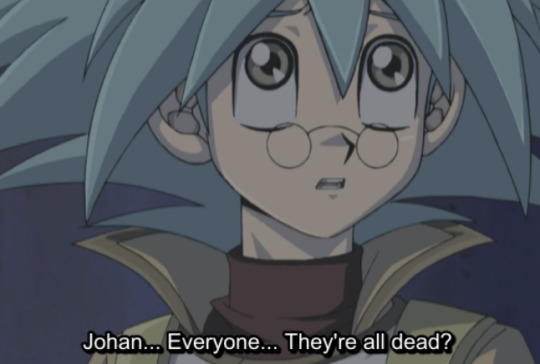
Judai: But at least I avenged them. Sho I'm really glad you're alive.
Sho: Those words... they're just lip service. Bro... bro, you're selfish. Before now, I thought of you as the sun. Someone who gave others energy and made the impossible possible. But, I was wrong. All you care about is getting your way. You don't care who you sacrifice. You'll do anything in the name of your goal. Avenging them won't bring back the people you sacrificed. You're just dueling to satisfy yourself.
Judai: O'brien!
August: I thought I told you to wait.
Judai: Are you saying what I did was wrong?
August: Think it over for yourself.
Judai: Why? What did I do that was so wrong? I... I did the right thing! And yet... everyone keeps leaving me! What... What is wrong with me?
Supreme King: Yuki Judai. To be willing to be evil to defeat evil. This world exemplfiies survival of the fittest. It must be ruled with power.
Judai: Power? I don't have that much power...
Supreme King: You hold the Super Polymerization card in your hand. Defeat the spirits that stand against you. Breathe their lives into it and complete that card.
After this point Judai decides to sacrifice everything else for power, and to complete the Super Polymerization card he's already sacrificed four friends four.
It's the culmination of an arc where Judai's only been praised for his strength and his ability to win duels. Where he constantly has been called to win duels to solve problems, until that stops working. When everyone is gone, all that's left is his strength. He had to keep winning to keep people safe, but even that wasn't enough, he was still missing something.
He knew he was missing something, that there was something wrong with him and he didn't know where to look.
Conclusion?
He needed power. If he had power, then he wouldn't have lost. If he had power then everything would have turned out alright. He didn't have the strength to carry everyone's burdens for them, that's why he lost, so what he needs is more power. He's been demanded to win, win, and win again so now winning is all that matters.
Now we have our second question: Is Judai's hero complex a good thing?
That's a definite no, because the pressure to always win, to always save everyone and carry their responsibilities has now completely broken Judai. To the point where he now believes that the only thing good about himself is that he's powerful, but he now is willing to sacrifice others to gain more power.
My name is the Supreme King.
Now here's the best part about Judai actively having a villain arc.
He does bad thngs. He does a lot of bad things.
It turns out when you're abandoned and left alone to suffer you do bad things, crazy that, I'm sure Yubel would have a lot to say about that.
Judai is also not being possessed in this scenario. They state it several times. You could say he's Shadow possessed in a Jungian sense. The supreme King is the symbolic embodiment of all of Judai's flaws that he's been ignoring until now. You could say Haou is representative of Judai's subconscious that has been repressed for so long until all those flaws finally surfaced, and that the Judai we see on a day to day basis is his ego, that the relationship between the two is a metaphor for conscious and subconscious.
Jim does a deep dive into Judai's mind, where we're shown a symbolic sequence of what the inside of his head looks like. Judai witnesses his friends appear in mirrors before they shatter one by one, all while he mumbles about how he needs to get stronger.
These are all storytelling devices to show Judai's fractured psyche, but Judai is still in control of his actions. Judai talks and responds to questions when he's addressed. Judai's friends confirm that it's still Judai, he's not a puppet or possessed.
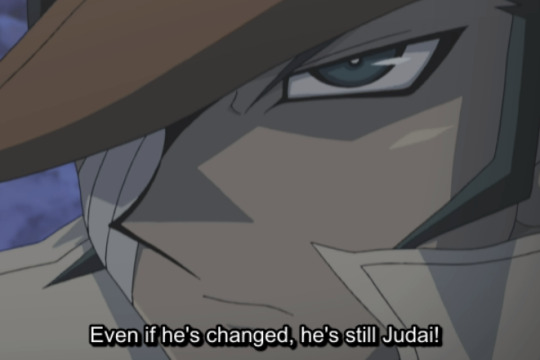
Misawa says later to Judai's face that he and the supreme king are the same person. Judai later is able to use the Supreme King's powers and maintain complete control, because the Supreme King isn't a split personality. Judai even says when Amon is sacrificing someone he loved for power, that he was doing the same thing as the Supreme King, sacrificing everything for power.
We later learn that the ritual that sacrificed four of Judai's friends was a part of Yubel's schemes, but that's the only thing Yubel set up. Judai made every bad irresponsible decision that led to his friends being captured. Judai was the one who snapped and decided to complete Super Polyermization after it was completed. Learning Yubel was behind the sacrifice ritual doesn't take away any agency from Judai at all, because Judai is responsible for his own decisions.
What it does do is create another parallel between them, because we learn the reason Yubel set up the sacrifice was to make Judai walk the same path that they did.
Judai is hurt, abandoned and isolated and in that situation he ends up lashing out at everyone around him in a similiar manner to Yubel. When Judai is put through similiar trauma, he doesn't overcome it in some heroic way because he's an innately good person, no he succumbs and behaves in ways that are incredibly similiar to Yubel.
Even when Judai's friends selflessly try to help Judai, he resists them every step of the way. He ignores their constant calls to him, their comfort, and he even fights them. Judai is eventually reached by the efforts of Jim and August combined, but they both die in the effort. Judai is saved because Jim and August were way better friends to him than he was to them.
Judai is effectively snapped out of his destructive spiral, but he's left alone with the sobering realization of everything he's done and the blood of two more friends on his hand.
When it's time for our hero to finally face Yubel, he no longer has the moral highground. Now when he faces Yubel it's not as hero and villain, they're just two sides of the same coin. Two people who when they were abandoned, lashed out and hurt everyone around them.
The question is no longer can Judai save Johan. The question now is whether Judai can live with the guilt he's carrying within him, and for that matter can Yubel live with the guilt of what they've done now too?
By this point Judai's been completely deconstructed. He's no longer the hero of the story, he's just a flawed person who needs to fix his flaws. He has the choice to live with his mistakes, and the biggest conflict now is whether he's going to save his villain foil Yubel, or strike them down in order to save the rest of his friends (the three that are left).
This also creates a much more compelling reason for Judai to save Yubel. Not just because Judai is responsible for Yubel's creation, but because they've both made the same mistakes, they have the same traumas and the same scars. Jim and August were willing to risk everything to save Judai even when he didn't deserve it, and didn't want it. Now is Judai capable of doing the same thing, of reaching Yubel the way he was reached, not for the sake of saving the world but for helping a friend?
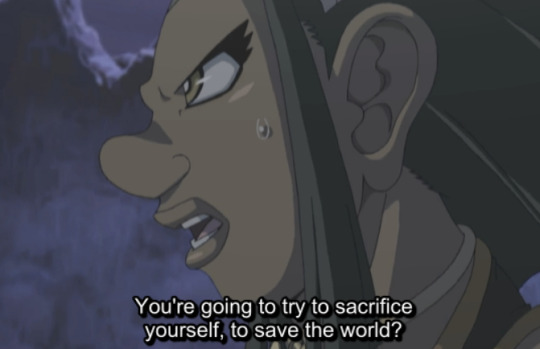
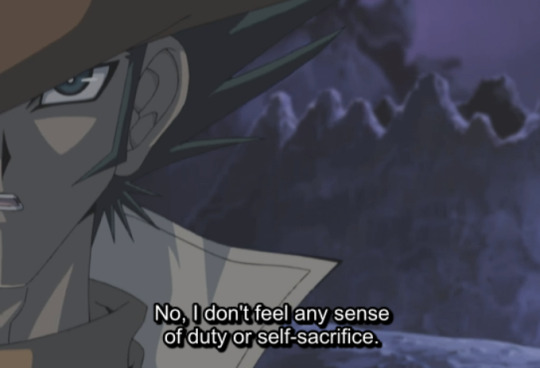
I just want to save my friend. That's all.
This is to me a very compelling setup for the challenge of whether or not Yubel can be saved. Judai's not really saving a helpless victim, he's not acting out of a sense of duty to sacrifice himself for the world, he's being challenged to save someone who suffers from all the same flaws that he does. Judai and Yubel are so similiar at this point it's really just Judai saving himself.
The Dark Deku Arc - Setup
This is the part where I'm actually going to praise MHA. Shocking I know. Season 1 and 2 of Yu-Gi-Oh GX are about 105 episodes in total. The Dark Deku arc begins at about episode 131 with Deku's decision to leave the hospital by himself to hunt down Shigaraki and AFO alone and try to understand villains better.
The 130 episodes up until that point are much better build up, than the first 105 episodes of Yu-Gi-Oh GX. To put it frankly GX is paced like ass. There's far too much filler, and because of that the plot points the anime is trying to make are delivered less efectively. In fact 105 is a good example of what I said above, that ideas are one thing and execution are another.
Season 2 especially is a season filled with good ideas and weak execution due to pacing. Here's one I use as a go-to example. There's a character named Edo Phoenix who's on a quest to find who killed his father. The ending of his plotline is he discovers that in a twist, the man who adopted him is the one who killed his father, and he's been encouraging Edo to investigate because it lets him spy on the police investigation and keep it off his tail.
That's a good twist - however that twist happens in the same episode that Edo's adoptive father is introduced. The audience is given literally no time to even get to know Edo's adoptive father, or get invested in their relationship so the twist doesn't hit at all. A better paced story would show Edo's relationship to his adoptive father early on, get you invested in them, only to pull the rug out from under you so you would feel the shock of that betrayal alongside Edo.
GX establishes its character cast, and yes the filler does give the cast time to breathe and they're all well characterized but because the plot around them is so poorly structured, none of the plot points really hit. Okay, Edo's adoptive dad is evil. Next! You can have good characters, but if you don't put them in a strong narrative framework that challenges them then those characters are just gonna kinda sit there.
The first 105 episodes of Yu Gi Oh GX does succesfully characterize most of the main cast, but it also feels like everyone's just goofing around. In comparison the first 135 episodes of MHA much more successfully builds an escalating conflict. Each new arc either introduces you to a new facet of the world, makes the amin characters more complex, or adds to the conflict.
We basically go from arc 1 "The hero high school is fun" to Arc 2 "The villains are a serious threat" to the Camp Arc "Oh shit, Shigaraki is learning and the villains are getting stronger."
When Bakugo is kidnapped at the end of the camp arc, the tension is ramped way up with the appearance of AFO, and All Might's retirement.
After that point we're introduced to the Overhaul arc, which not only again makes the League of Villains more complex and sympathetic, but also introduces the audience to All Might's more flawed side - the fact that All Might literally worked himself to death saving others and it still didn't work.
Then My Villain Academia -> The Villains are now a threat and they have an army.
Each arc builds on a previous arc, the characters and the world grow more complex, and it feels like you're learning about these complex issues alongside the characters. It just makes Yu Gi Oh Gx look like the silly card games show by comparison, by setting up this very layered world, and conflict, and heroes that challenge the protagonists on what it means to be a hero and what it means to be a victim.
Then all of that great setup.
We are side by side with the proagonist. We, like Deku now want to see if someone like Shigaraki can be saved. We, alongisde Deku want to better understand the villains and learn to see them as people. We want to know if the corrupt hero system can be salvaged.
However, these are too many questions so let's boil it down to two once more, because this is looking at Deku's character.
Deku and Judai are in some ways different as night and day. Deku is an introverted nerd and the victim of bullying, and he starts out with no quirk at all. Judai is a self-confident, charismatic prodigy who instantly seems to charm and befriend everyone around him. Deku desperately wants to be the hero and works his way up there, whereas Judai is just kind of thrown into the school hero because he's the best at dueling.
Judai is kind of a mix of Bakugo and Deku's traits, he's a self confident prodigy who always wins, but he's also someone obsessed with heroes and who has a hero-complex where he's continually forced to save others.
The Dark Deku arc, like the Supreme King Arc looks to take a darker, more introspective look at Deku's character, while also exposing Deku who is a sheltered kid to the a very grey on grey world. It also seeks to deconstruct Deku's suposed "hero complex". Despite the many differences between Deku and Judai I believe the two questions an be boiled down to the same thing.
Is Deku Selfish?
Is Deku's hero complex a bad thing?
These are the questions the series itself is asking in the deconstruction of Deku's character. Deku himself is asking if there's a better way to save villains tha just beating them down or outright killing them, but we'll discuss that later.
Just like Judai there is some setup before this to give a previously very one-note Shonen protagonist mor depth. Deku and Judai are both people who fit the determined, punchy, solve everything fist fight shonen protagonist to a T, on top of being the one to always show up to fight for their friends. Just like in the beginning of season 3, we do have some hints before this that there's something wrong with this attitude. That there's something about Deku that's not entirely there.

There's a flashback of All Might talking with Bakugo where Bakugo discusses that the fact that Deku never takes cares of himself or factors himself into the equation when he always puts others first deeply bothers him and there's "something wrong with it" that's made him always push Deku away.
This flashback also leads into a scene where Bakugo pushes Deku out of the way of one of AFO's attacks, telling him to "stop trying to win this on his own." In an attempt to make Deku see that he's not fighting alone this time.
Deku has also been warned repeatedly about the way his power destroys his own body when he uses it, warnings he's repeatedly chosen to ignore. Saving others isn't just a goal for Deku, you could arguably say it's a method of self-harm and that's what unnerves Bakugo. Bakugo even gave a similiar speech in the past, about how someone like Deku shouldn't take all of the bullying that Bakugo has given him over the years and still try to be his friend afterwards. At this point it's not really like Bakugo's done anything other than tone down the constant insults a little bit, he hasn't apologized or anything but even this early in the manga Deku has a tendency to just let Bakugo's treatment of him go. It's not like they were super best friends forever before the bullying started either despite what the shippers might tell you. Bakugo is saying it's weird that this kid just takes it, and takes it, and takes it without fighting back like he doesn't care about how people treat him and Bakugo is right... that is weird!
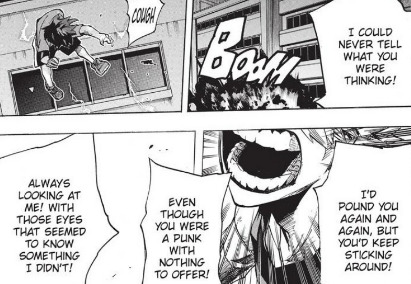
Deku either has such low standards for how he's treated that he just lets Bakugo get away with it, or he just doesn't hold a grudge when he is mistreated because his pain and his suffering just always matters less. Either way it's not healthy, and it could be indicative of a deeper problem hiding behind the surface.
Either way there's setup here, because on one hand you have everyone and their grandma praising Deku for his "drive to save others that eclipses all common understanding."
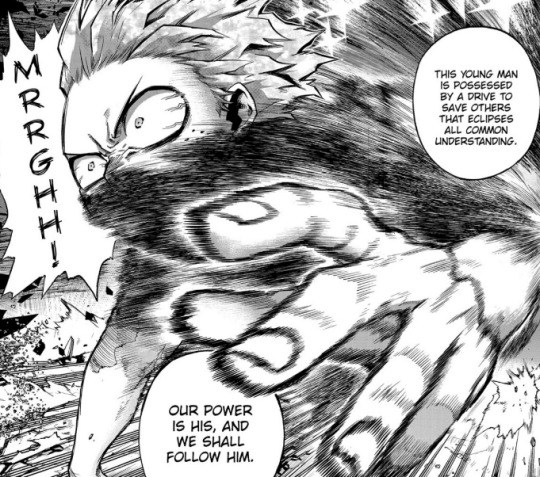
While at the same time he's criticized by Bakugo for having no regard for others. This could be the setup for the character trait that led to his earlier success leading to his downfall later. In Judai's case, everyone praises his purity of heart, but then that purity is later criticized as childishness, naivete and a refusal to grow up.
As for Deku...
How can you protect others if you can't even bother to protect yourself? How can you save others if you can't save yourself? That's the question Touka asked of Kaneki in Tokyo Ghoul when she rightly called out his desire to protect everyone at the Anteiku Cafe as just a roundabout way of getting himself hurt by acting recklessly.
In Kaneki's case he's not trying to protect anybody, he's just picking battles against the doves and getting himself hurt. He's acting out a hero complex in the sense that if he feels like he didn't fight his friends battles for them like Judai then he wouldn't have any friends to begin with. That's why Touka also says "Besides that, everyone doesn't belong to you. You have no business protecting us."
Is Deku fighting for the same reason? Does he harm himself to protect others because he views himself to be worthless and the only way to demonstrate his worth is try and fight to save others?
We don't get an answer for that question. Judai thinks duels are fun, and he's really good at them, and because he's good at dueling he's made friends. He think to keep those friends he has to keep dueling for the sake of others.
Deku's not motivated by the idea of protecting or keeping his friends, that's a secondary motivation. All we have on Deku is that he feels a strong desire to save others, and that he worshipped heroes like All Might growing up but has a naive idea of what a hero is supposed to be. However, his lack of motivation could be the "something that's missing" just like Judai has.
The GX writers did some hardcore digging into Judai's character by focusing on how shallow he was in motivation compared to everyone else, and showing that to be a symptom of his childish naivete.
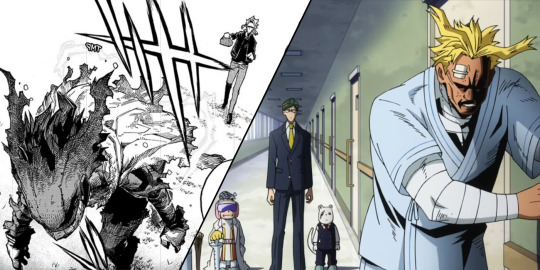
There's also the potential parallel between All Might and Nighteye's breakup, and Deku's decision to leave all his friends behind to hunt for Shigaraki himself.
Even if Deku doesn't have a deeper motivation than just "an unnatural drive to save others" then you could show the effects of Deku walking down the same path that All Might did, the belief that he has to be the one to save everyone singlehandedly and if he rests for a single moment than someone might die, leads to him not only destroying his body, but also doing permanent damage to all of his social relationships.
Even if Deku's motivation isn't too deep, you could still have the traits that led him to earlier success now driving him to ruin as the story punishes Deku for his excessive selfishness.
This is also where we finally get back to Deku's goal of understanding Shigaraki, and contemplating whether or not it's possible to save villains without killing them.
I draw a parallel between this and Judai's enemies calling him out on lacking "darkness of the heart" and that without understanding that darkness he can't win.
Judai's lack of darkness of the heart means two things, he's not mature enough to understand the reason why his enemies are fighting, and he's also not mature enough to se the darkness in his own heart which is why he ends up blind to his own flaws and making pretty severe mistakes later on.
For Deku, it's mainly a lack of understanding of the motivations of the villains he's fighting again, villains he's only ever really beat down with his fists until now.
However, for Deku lacking darkness of the heart you could also re-contextualize that as meaning because of his idealization of heroes he's never once looked at the darker sides of hero society that might have driven people into becoming villains.
Deku's lack of inner darkness may just come from the fact that compared to the villains he's fighting against, he's gotten to live a pampered life. Without understanding that darkness, he can't be a full person because he'll still be a naive sheltered child, and not an adult wise to the way the world works and the moral greys he inhibits. Either way, it's just as necessary for Deku to gain an understanding of "Darkness of the Heart' as it is Judai.

So here's all the setup for the start of Deku's Dark deconstruction arc. As different as these characters and scenarios you can still boil it down to those three narrative questions about Deku / Judai, is there behavior selfish? Are there hero compelexes a good thing? Do they need to understand darkness of the heart?
Before moving on I'm going to summarize Deku's setup as thus:
Deku's actions are selfless.
Deku's motivations are also selfless (a desire to save others).
Deku does not benefit from saving others in any way, if anything he actively harms himself in order to do so.
Bakugo finds this behavior incredibly disturbing.
All Might destroyed his body and burned all bridges because of similiar flaws to Deku.
So the answer to the first question is Deku selflish? No. Is his hero-complex a bad thing? Potentially.
While Deku himself decides that he needs to understand darkness of the heart in order to better understand villains. Deku is actually more set up to contemplate darkness of the heart than Judai is, because Judai charges into the dark world blindly with only the motivation of saving Johan not even caring for Yubel, while Deku has the explicit motivation of trying to understand the little boy inside Shigaraki.
DEKU LEFT THE HERO ACADEMY
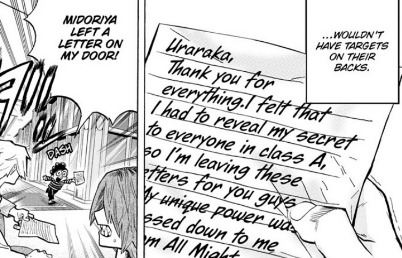
Deku begins the arc by leaving alone to go searching for Shigaraki, with hand-written letters addressed to all of his friends that tell the truth about One for All and also say Goodbye. He makes the deliberate decision to leave them behind so they don't get targeted alongside of him. It's a pretty classical superhero motivation, I need to cut myself out of my loved ones life in order to protect them. Of course this sort of ignores that everyone in his class has super-powers too, but you know heroes they're all such drama queens.
Is this selfish behavior?
This is going to be the only time I'm going to solidly answer yes. Deku clearly did not take his friends feelings into account. His desire to protect them, is more important than their own agency. They also might want to fight alongside him, they'd be upset if they saw him die or get hurt trying to protect them. Deku thinks of his own feelings of wanting to keep them safe and not being able to handle the emotional burden of protecting him, more than he does their own personal feelings.
This is also something that All Might did they permanently burned all of his bridges with his sidekick and friends, and deeply hurt his sidekick who was just asking him to take a break so he did not get himself killed and quit because he didn't want to watch All Might slowly kill himself by inches.
Deku is being selfish here, and later on when he does face his friends he even acts pretty condescending belittling them and insisting they can't fight on their own or keep up with him.
However, I need to ask a secondary question.
Is there any lasting consequences for this selfish behavior?
Besides the fact that it hurt his friends feelings for a little bit, no. I spent a much longer time covering this in Judai's sections because Judai's selfish behavior led to character conflicts. Judai disregarding his friends led to everyone starting to resent him in the Dark World, and their once tight-knit friend group further falling apart.
Judai on three seperate occasions makes impulsive decisions to run ahead without consulting with the group. The second time he outright lies to the group and sneaks ahead without them. THe second time all of his friends are captured when they go after him and try to follow him to give their support because they're worried about him. The third time he makes the decision to run ahead, he knows about the danger they're in and the risk of getting captured and he just blatantly ignores them. When August notices they're missing Judai doesn't even go looking for them because they're not a priority at this point - saving Johan is.
This is something that has very real and lasting consequences in the story, they're captured because of his recklessness, and sacrificed in front of his eyes. Even though they technically come back in season 4, the trust between Judai and his friends is all but gone and he's alone for a lot of Season 4.
Judai's decision to abandon his friends has direct and lasting consequences. He is being punished for his hero complex. Running ahead, and fighting alone against the bad guys is what Judai has always done and what's worked before, but now in a more complicated world it's not cutting it and Judai is being challenged for his flaws.
Deku hurts his friends feelings a little bit, but even in that case the focus is on how sad it is for Deku, how hard it must be to be a noble hero fighting alone.

Deku's Mary Jane and Spiderman bullshit never impacts his friends directly, other than the fact that they find it slightly condescending. His "I need to keep secrets from my loved ones attitude" is challenged because his friends want to fight alongside him, but there's never any narrative punishment delivered to him. It's just solved with one fight scene and a character holding out their hands. Whereas, the consequences for Judai's rash actions last two seasons.
I call it "Mary Jane and Spiderman" Bullshit, because Spiderman keeping his identity a secret from all his loved ones is a big conflict in the comics. Something that got Gwen Stacy killed, because Peter Parker never told her his identity in order to protect her, and then that just ended up with Norman Osborne finding out about her anyway and kidnapping and killing her.
You might have heard of the "Death of Gwen Stacy" it's a pretty famous moment in comics. It's also a case where it shows that the Hero's failure to communicate honestly with their loved ones in the name of "Protecting Them" can actually get them killed.
There's even consequences in MHA itself for heroes choosing to sacrifice their personal lives to help complete strangers. Shigaraki literally made a whole speech about it. Kotaro Shimura is traumatized for life over his mother's decision to abandon him instead of giving up on being a hero. Nana Shimura believed she was doing something selfless in sending her child into foster care to keep him out of AFO's clutches, but that was shown to be wrong as AFO just found Kotaro's household and then destroyed him later on in adulthood anyway.
So in the story we are shown scenarios where choosing to abandon your loved ones in the name of "protecting them" can have disastrous and lasting consequences, but as for Deku himself, the decision to leave the school has basically no consequences whatsoever.
Well, Deku making the decision to fight alone is something that might lead to some consequences. After all, Judai's breakdown came about because he always felt the pressure to fight alone and carry everyone's weight on his shoulders until he couldn't.
Perhaps, with Deku fighting alone to protect everyone we'll reach a similiar breaking point. Just as Judai couldn't handle carrying everyone's burdens, looking for Johan, and leading his friends into the Dark World all that the same time and eventually broke down maybe we'll see Deku break down because he just like All Might can't carry the burdens of an entire nation - oh wait nevermind he's working with the Top 3 Heroes.
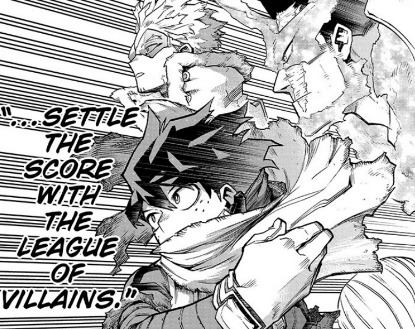
Even the premise that this is Deku leaving the school, to become something like a vigilante wandering the countryside trying to fight AFO on his own is just incorrect because Deku is receiving government assistance right now.
In the Dark World it was really just Judai and his friends, so every single bad decision Judai made had consequences because they were well and truly alone. Deku has backup so he's not even really "alone" in the arc that's supposed to be about him fighting AFO and trying to understand Shigaraki alone.
ALL YOU'LL FIND IS BLOOD AND VIOLENCE
Let's briefly focus on questions two and three, is Deku's hero complex bad, and does Deku need to understand darkness of the heart?
Judai's hero complex was based on the idea that if he wanted to have friends he needed to fight for them and solve their problems for them.
Judai got in such an unhealthy negative feedback loop, that he had to carry his friends burdens in order to maintain his friendships with them, but at the same time he couldn't receive any help from them because he made their friendship all about him carrying their burdens. He was operating underneath an amazing pressure to always win until he lost. The very thing he did to try to maintain his friendships, keeping his friends at arm's length and fighting alone is exactly what ends up driving them away and leaving him alone.
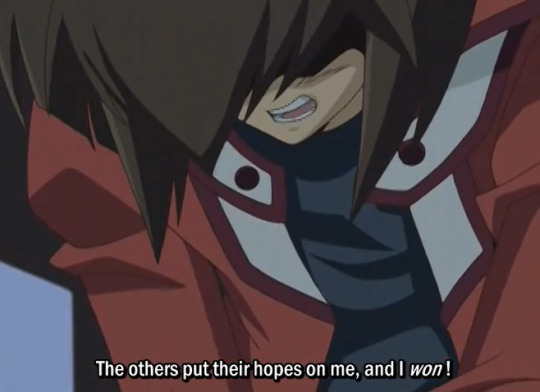
But, still...!
They're all... They're all gone. There really was something missing in me. But what is it? What was missing? What should a duelist burden themselves with?
Judai paradoxically fights alone in order to keep his friend group together, which only ends up with him losing four friends and being abandoned by the rest when they're disappointed for him in his selfish behavior. Judai screams out why, realizing he did something wrong here, that something went wrong because he's been winning duels, he's been fighting the same way he did before only to end up with the worst option possible. The realization that he is truly alone breaks him down entirely.
Judai's hero complex unwravels when simply charging ahead to fight doesn't work for him anymore, because the situation becomes more complicated than that. Darkness of the heart can mean many things. Judai not understanding his own personal flaws. Judai not seeing how his flaws are affecting others. Judai not looking at other people's emotions, he doesn't hear or respond to criticism when his friends start trying to tell him how is selfish decisions making is making them feel.
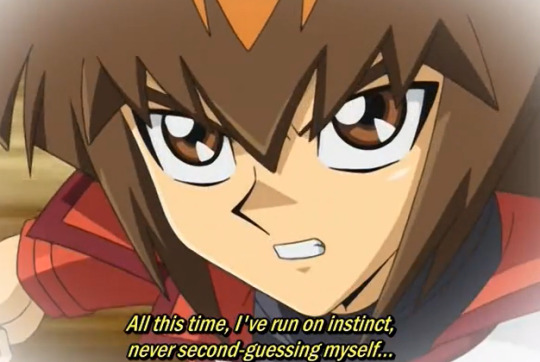
I can't just stay and wait. All this time I've run on instinct, never second-guessing myself. If I just stand still now... I'm sure I won't be able to start running again. And I won't be able to get to Johan.
Judai's hero complex has a clear source - he believes he has to keep running ahead and fighting for his friends the same way he always has in order to keep those friends and if he stops he'll lose everything / succumb to the guilt he now feels about being uanble to save Johan. His Hero Complex also has clear consequences, him running ahead without thinking gets all of his friends kidnapped and used in a sacrifice ritual that could have been avoided if he had made different choices.
Spiderman kills Gwen Stacy because Peter Parker deciding to not tell her about his secret identity to protect her backfired and made her an easy target to the Green Goblin.
Heck, Spiderman's entire character is about how the burden of being Spiderman and his Hero Complex constantly sabotages any attempt he makes at having a personal life. Miguel O'Hara's catchphrase in the incredibly popular Spiderman movie is that "Being Spiderman is a sacrifice" and he's not wrong either.
SO, is the narrative punishing Deku's hero complex in any way?
Well, the one warning he did receive that if he kept fighting he'd lose permanent loss of his arms turns out to not matter anymore because his body is just stronger now.
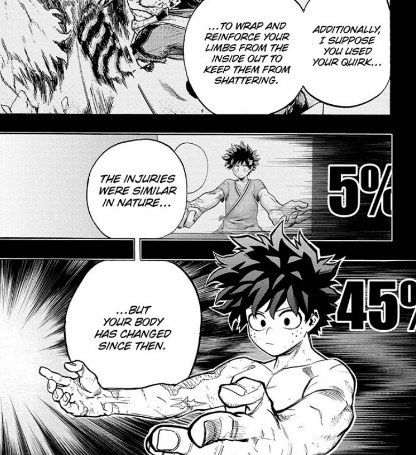
So, even the phyiscal toll of fighting alone that's a consequence for Deku doesn't actually apply here.
I keep talking about consequences but what do I actually mean? Am I talking about strictly punishment? Do bad things need to happen to characters in order to get their lessons?
Not necessarily.
When I say "consequences" I mean in terms of actions always having consequences in a story. The best stories are succinct, that means you basically cut down in as many frivolous details in a story as much as possible so everything that happens onscreen is something that matters and contributes to the whole. Therefore, every action should have a consequence directly seen onscreen in story. Stories are all actions and consequences, the choices the characters make should have direct impact on the plots and the other characters because it makes those choices seem like they matter.
If the story constantly draws attention to the fact that Deku is afraid of ducks, but the story takes place on the moon and there are no ducks living on the moon then that's a wasted plot thread because there are no consequences. If a character does something bad, other characters should discuss it, or it should negatively impact them in some way.
When Judai decides to run ahead without all of his friends for the first time after they all agreed on a plan, the result is the next episode they all start talking about their shared doubts with Judai when he's not around. If they all just swept Judai abandoning them under the rug, then Judai running ahead and leaving the others alone doesn't feel like an impactful character flaw.
There's no lasting consequence for Deku's hero complex. It doesn't drive him to any kind of breaking point like it does Judai.
I think the reason why is because there's no real moment of failure for Deku. When he tries to ask Muscular why he fights, and Muscular rejects him and says that he was just born evil and has no deeper motivations, Deku's not frustrated at all.
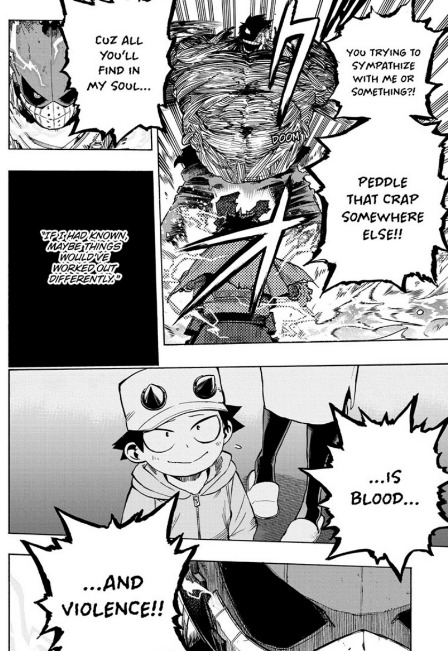
Deku who feels a "unnatural desire to save others" isn't really bothered by the fact that Muscular insists that he can't be saved and that they can only fight. Despite this technically being a failure, Deku has failed to talk a villain down, failed to find a way other than fighting and also failed to understand the darkness in someone's heart it's of little consequence because it's not framed as a failure.
Deku just punches Muscular, back to the drawing board.
There's another manga called Choujin X running right now, where the main character is on a similiar quest trying to see if there's a way they can save the big bad Sora Shihouhin, and when he is forced to fight against a villain who won't back down, de-escalate, or listen to reason he has a complete emotional breakdown.
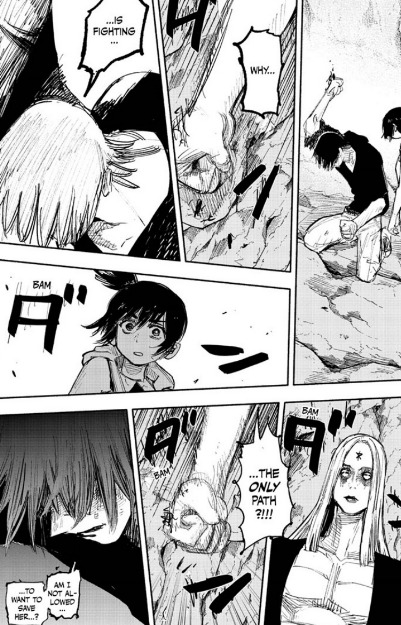
This is the reaction of someone who's genuinly invested in the idea of saving the villain, and frustrated with the reality that he might not be able to save her, that he can't talk to the villains or convince them to back down. Tokio's not even characterized by an unnatural desire to save others like Deku is, so why is he the one breaking down and not Deku someone apparently so selfless that he wants to save the mass murderer that's trying to destroy society?
If Deku's desire to save others is so strong why doesn't he show frustration at being unable to talk down, or understand Muscular?
Judai is stuck in a negative feedback loop where he's forced to fight for others, because he believes he has no worth to his friends otherwise. All we're told of why Deku feels the need to save everyone around him is that he's just like that, he just feels like saving everyone no matter who they are the moment they come into view.
If we're choosing to characterize Deku that way, then number one he should be attempting to save everyone, and number two the stress of having to save everyone is something that should get to him. His "Hero Complex" should be what's breaking him down at the moment. The unnatural desire to save everyone around him that led him to so much success should be what's punishing him this arc.
Judai felt pressure from two aspects, first the pressure to carry everyone's burdens, and second the lack of understanding of darkness of the heart. Unlike Judai who doesn't want to understand darkness and who avoids it as long as possible, Deku goes into this arc actively seeking to understand how his villains think.
Deku and Judai also suffer from a lack of darkess in their own hearts. This leads to them having empty motivations. Judai has a childish desire to enjoy fun duels. Deku has a childish desire to save everyone. Neither of them have tried to grow or change or even question those motivations in any way and because of that they're stunted people.
Judai doesn't know why he fights. He doesn't question why he fights. He just takes on the burdens of others to give him something to fight for. This all together leaves Judai blind to his own personal darkness, and also because of that blindness he can't grow in any way because he never evaluates himself, he never looks at himself and tries to change.
When he's on his knees and at his breaking point he screams at the top of his lungs, "WHY? WHAT AM I MISSING? WHAT DID I DO WRONG?" simply because Judai's never thought about these things.

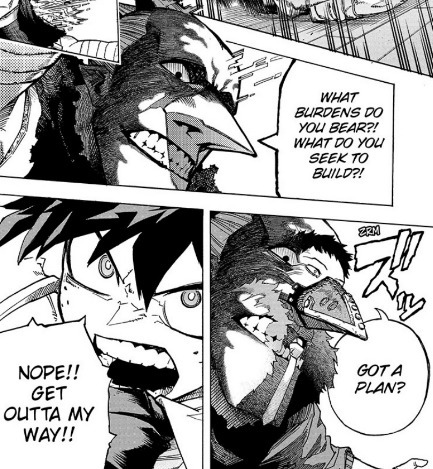
Deku's asked these same questions both in the Dark Deku arc, and hundreds of chapters later he's asked what he's planning on doing as a hero in order to make things better and Deku never materializes an answer.
Pre-Dark Deku Arc, during Dark-Deku Arc and Post Dark Deku arc, Deku always solves his problems by recklessly jumping in and saving others. There's never any point where he's punished or criticized for this behavior in any significant lasting way. He never has to self reflect and develop a reason on why he wants to save others, or eve think about how he's going to save others, he can just keep acting as the rash, impulsive hero.
Judai and Deku are both characters who are empty, and lacking in motivation but Judai is ruthlessly criticized for that until he reaches his breaking point and is forced to look at his motives.
This once again comes from a lack of failure on Deku's part. Deku never fails the way that Judai does. There's a scene where you could have easily had Deku fail. The entire Nagant vs. Deku fight where Deku fails to give her any substantive answers to his questions.

Imagine if Deku's simple philosophy of always extending a helping hand failed here. Imagine if Deku actually got deeply ivnested in the idea of saving Lady Nagant, and did his beset to talk and reach out to her but his answers weren't enough and because of that she just chooses something like suicide. Imagine he has her by the hand, and she's dangling off of the roof and he thinks that his impressive move to save her should have been enough - he's reached out a hand like always. He thinks this should have won her heart over, by showing her that someone still cares in all of her despair.
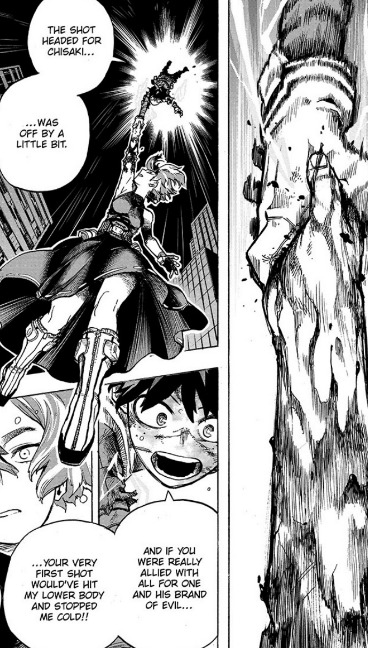
Then, Nagant in one final spiteful move lets go. The person he heard her entire backstory, the person maybe he once was a huge fan of her when she wasa hero, the person he wants to save the same way he wants to save Shigaraki chooses to let go and fall to her death because dying would be better than living in whatever kind of corrupt world that Deku is trying to build.
This could be Deku's Gwen Stacy moment. Spiderman carelessly webs Gwen Stacy whe she's falling to catch her and for a moment he thinks he's saved her because he's overconfident and has caught people falling like this a thousand times, only to find out he's snapped her spine. His overconfidence, his hero complex making him believe everything magically would work out led Gwen Stacy to her death. This could show the simple act of just offering a hand out to someone in need isn't enough, without empathy and understanding.
Instead, AFO just blows Nagant up in Deku's face.
Except, that isn't even a failure bcause Nagant turns out to be just fine! There's no point in blowing up Nagant except for the spectacle of it, because she turns out to be fine five minutes later and even shows up to fight in the next arc.
There's no consequencs to anything that happens in this scene. Deku doesn't suffer any consequences for being blind to the faults of society. (He's working right alongisde a killer cop just like Nagant and he doesn't even care.) Deku isn't forced to reflect on what saving people or making society better would even mean. He also isn't punished for his lack of understanding the way that Judai is.
Afterwards, Deku denies help to a very mentally-ill Overhaul, who is apparently not one of the villains that Deku wanted to save. There's a whole buch of asterisks on that "Deku wants to save everyone***" goal. This also isn't framed or used to paint Deku in a bad light because Overhaul is unworthy of salvation in Deku's eyes for hurting Eri.
Is this action part of an arc? Is Deku reaching his limit with trying to sympathize with villains only to see people like Overhaul and Muscular fighting him every step of the way and telling him they don't want to change?
Nope, this scene is never brought up again.
Deku never fails, and he never does anything wrong. Even when there are situations where you could argue he does do soemthing wrong, like denying the armless, mentally ill Overhaul help - he's not painted as being in the wrong.
The entire arc is supposed to be about criticizing the protagonist for their hero complex, and their lack of understanding of the darkness of the world but for Deku there's no criticism to be had here.
Compare this to the sacrifice ritual in the Supreme King Arc, where not only does Judai fail to save his friends, but the friends that survive ruthlessly tear into him aftewards for his selfish behavior. THe actions of one protagonist matter, have consequences in the story and are criticized. The actions of another protagonist have no real consequences and are never criticized.
The whole mansion blows up and... nothing happens. No one's injured in the explosion. It may as well have not happened in the story because there are no consequences for Deku just continually choosing to blindly run ahead like his hero complex tells him to.
There's evena moment where Deku winds up in a similiar situation to the dark ritual. After receiving information from Nagant, he blindly wanders into a mansion in Haibori woods believing it to be AFO's base, only to find out it was a trap and AFO was waiting for him to blindly charge in all along.
THAT'S WHAT MAKES US HEROES AND VILLAINS
This is where I'm going to talk about another big similarity between Deku and Judai, and also the biggest point of divergence in the Dark Deku and Supreme King Haou arcs.
Deku and Judai are both character foils with Shigaraki and Yubel respectively. This is where I'm going to praise MHA again, surprising everyone.
The foiling between Shigaraki and Deku is masterful. They both started out in relatively the same place, as boys with dreams to become heroes who were softly told no by their parents. Tragedy struck Shigaraki and he killed his family on accident and wound up alone wandering the street for days until he was found by AFO.
They're both the students of the greatest hero and villain of the last generation. They both end up being surrounded by a group of close Nakama that they want to protect. They're both continually challenged to grow up, and show how they're going to be better than their predecessor for the hero and villain sides respectively. They both have to prove they are worthy successors. Shigaraki has all the heroic spunk and determination that Deku has but on the villain's side, and while Deku loves heroes, Shigaraki is hero society's critic wants to bring down the hero system that didn't save him.
You get the feeling that Shigaraki really is Deku just in a different situation, a same person on the opposite sides of the conflict kind of character foiling.
As the biggest Yubel stan here, in some ways the foiling for Shigaraki works better than the foiling for Yubel because Shigaraki isn't just Deku's foil, he's the foil for all of society. Yu-Gi-Oh Gx takes place in a society run where everything centers around card games, it's not really that deep. In My Hero Academia you have that 100 episodes of great setup where Deku is not only learning to look at the darkness within himself, but also the darkness within hero society around him.
Judai's narrative as much as I love it, is entirety about Judai.
Not only could Dark Deku arc develop Deku's character, it could also say something deeper about the world it's taking place it, because Deku has all these connections to Shigaraki, who also kind of represents the orphaned boy failed on all levels by the society around him.
Shigaraki is the shadow of -> Deku, but also Shigaraki is the shadow of -> all of society.
Yubel is the shadow of -> Judai, and only relates to Judai's personal growth.
Yubel is Judai's personal villain, and was created by his actions as a child. His decision to abandon Yubel into space, led to Yubel being tortured and their later madness.
Yubel is also Judai's shadow. They carry all the same flaws, but those flaws are obvious in Yubel and repressed in Judai. Yubel's belief is that Judai is someone who purposefully enjoys hurting their friends, and that's how he shows his love. While that's twisted it's not hard to see how Yubel came to that conclusion. After all, Yubel loved Judai so much only for Judai to abandon them and turn a blind eye to their suffering. In the Dark World, Judai abandons his other friends continually in order to search for Johan, and they wind up suffering too.
While Judai doesn't sadistically enjoy hurting others as Yubel put it, there's an element of truth to Yubel's criticism. Judai does abandon people, Judai isn't as empathic as he seems to be. When Judai is subjected to the same kind of isolation and abandonment that Yubel has endured for the past ten years, Judai loses his mind a whole lot quicker and starts lashing out at everything around him the same way Yubel has. Judai without the love of his friends starts to hurt everyone around him in his lashing out, the same way that Yubel desperate for love starts to inflict pain on the people she loves. Even before the ritual happened, Judai was unwittingly hurting his friends with his own selfish behavior.
Yubel's stated criticism is "of Judai is "Anguish and sorrow born from loneliness. That is the nature of love as you taught it to me" and further beyond that "When you forgot about me, I suffered. It's hot. It hurts. I am in pain. Why? You know how much I love you? Why did you do this to me, Judai? In that moment I realized that was how you showed love. Because you loved me, you hurt me and made me suffer."
That sounds crazy, but hasn't Judai been hurting the people he loved for his own selfish reasons this entire arc? Is it that crazy then to conclude that neglect and abandonment must be how Judai treats everyone he loves, so surely he loves me.
One of the biggest criticisms of this arc is how Judai's behaviors impact his relationships, so of course his most personal villain and foil is his jilted ex nonbinary dragon lover. On a less joking note, when Yubel was displaying troubling behavior as a child, Judai's first response was to abandon them. Which is ironic for someone like Judai so paralyzingly afraid of being abandoned that he became everyone's workhorse and worked himself to death solving their problems for them. Who when abandoned by those friends finally, snaps just as hard as Yubel did when they were abandoned.
Do you see the parallel I'm drawing here? Judai is slotted into the spot of the protagonist who's friends with everyone he meets, who loves and fights for his Nakama. Yet under closer scrutiny he's shown that he doesn't really understand what love or friendship is or how to give and receive love from others in a healthy way. His antagonist is his former childhood best friend, who is obsessed with love and demands that Judai love them back. Judai's lack of understanding of relationships and love takes a dark twist with Yubel, their shadow, foil and antagonist.
These are once again very personal challenges to Judai, society doesn't really factor into this equation. Though, Judai is somewhat challenged as a hero because there's an irony to Judai plunging into the world to save his best friend Johan who he's known for like three weeks, but not really lifting a finger to save the antagonist of the arc Yubel who he's known since childhood and is personal responsible for putting through torture.
That hypocrisy there too, is a personal challenge to Judai that paints him in a less heroic light. He wants to save Johan and ignore Yubel because it's easier, because saving Johan relieves him of his guilt. He doesn't even know what to do about Yubel, so he doesn't try and falls back on his previously established behavior of playing the hero.
The hero is really just a mask for Judai at this point, something the story has ripped right off of his face by the time it comes to face Yubel.
There are two ways in which Yubel serves as an ultimate foil to Judai.
Yubel acts like a callout post to all of Judai's flaws
Yubel represents a dark path Judai could have taken.
This second one is what Shigaraki and Deku have in Common with Judai + Yubel. There's something deeply tragic about the idea that while Deku was making friends, getting taught by a loving teacher like All Might, Shigaraki was all alone being pushed by a ruthless manipulator like AFO into becoming the worst villain.
Judai and Yubel's lives follow the same tragic parallel path. They began in the same place as childhood friends, but after abandoning Yubel, Judai spent the next ten years growing up, making friends in a healthy and safe envirnoment while Yubel the one who was abandoned was alone in space desperately crying for Judai to come save them only to be ignored because Judai has long forgotten them.
However, there's a striking difference there too. Yubel is created directly by Judai's neglect and actions. Whereas Shigaraki is created by the neglect of all of society, it's not Deku's fault directly.
#1 Shigaraki acting as a callout post to Deku's Flaws
However, this is where Shigaraki's callout post comes in. Shigaraki gives a long speech on how the existence of heroes itself, creates villains like him.
"You heroes pretend to be society's guardians. For generations you pretended not to see those you couldn't protect and swept their pain under the rug. It's tainted everything you've built. That means your system's all rotten from the inside with maggots crawling out. It builds up little by little, over time, you've got the common trash all too dependent on being protected. And the brave guardians who created the trash that need coddling. It's a corrupt, vicious, cycle. Everything I've witnessed. This whole system you've built has always rejected me. Now I'm ready to reject it. That's why I destroy. That's why I take power for myself. Simple enough, yeah? You don't understand because you can't understand, that's what makes us heroes and villains."
To break it down simply, heroes look away from the faults in their society, they intentionally ignore the people they cannot save, and when those people turn into villains the heroes beat them down hard. The villain attacks then convince the common people of the need for heroes, and the cycle perpetuates itself. This is all powered by the people's blind, uncritical faith in heroes.
Deku is a person who has that same blind, uncritical faith in hereoes, and until this point has never thought of Shigaraki as anything more than a villain to be punched until he stops. Which is why this is still a callout post that applies to Deku, because Deku's blind admiration for the Hero System is part of the problem that enables the very flawed hero system.
Deku does not understand darkness of the heart, therefore Deku does not understand that heroes could possibly be bad, and he could possibly be supporting a bad system until he's slapped in the face with it.
However, is there a lasting consequence for Deku's blind support of the hero system?
Nope.
I just described up above what could have been a consequence, if Lady Nagant refused to have faith in Deku since he didn't back his words up with action.
Deku also clearly does not want to break away from the corrupt hero system that created Shigaraki, because the heroes that he brought along to fight with him are Endeavor, Hawks and Jeanist, a child abuser, a state sponsored murderer, and a guy who makes bad puns. He doesn't change any of his bahavior that enables the corrupt system to stay in power.
Not teaming up with the Top 3 heroes, and deciding to go full vigilante would have at least have been breaking away from that system.
This circles around to a big underlying problem in this whole arc in that Deku isn't really doing anything different from what he was doing before, and he's not punished for his character stagnancy either.
So we're left with.
#2 Shigaraki represents a dark path that Deku could have Taken
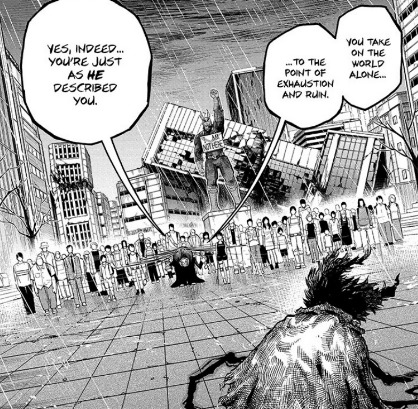
This is where Judai / Yubel succeeds and Shigaraki / Deku falls flat on its face.
When pushed to his absolute limit after failing repeatedly, Judai snaps. With no friends left he decides that all that matters is power. This path seems natural for him because we've already seen what being abandoned and left alone can do to a person and how it twisted Yubel. The story hints again and again at Judai's blood knight tendencies, and that he thinks the only thing he has of value to offer others is strength by fighting for them.
He loses his friends and the fighting is all he has left.
At the point of despair he decides to just embrace power. If he cares about nothing more than strength, at least that will give him some sense of control over his life after the out of control tragedy that happened to him.
"Yuki Judai. In order to defeat evil, one must become evil. In a world with the law of the jungle at work, one must rule with power."
"Power? I don't have that kind of power."
"In your hand lies the super polymerization card. Defeat any spirits who may oppose you, and combine their lives into it to perfect the card."
Supreme King is just a villain persona that Judai adopts to as a protetive blanket for all the hurt and pain they've gone through, just like ding, ding, ding, the villain persona Shigaraki Tomura is for Shimura Tenko.
Judai snapping under such intense pressure shows us that if even the faultless hero can snap, then how much can we blame the villain for snapping under similar circumstances? Maybe the reason both the hero and the villain fell is because they're both equally human and to fall down is human.
Deku never falls down as hard as Judai does. He doesn't even fall down and scrape his knee. There's no instance where he fails to save anyone. There's no instance where his actions hurt anyone. There's no instance where he takes things too far and hurts a villain. I kow it's unlikely for Deku to turn into a villain, but he could have at least gotten so frustrated he turned into a punisher style vigilante! Is that too much to ask?
There's not even a single moment where Deku goes too hard in a fight and injures or even kills a villain. They could have pulled an "I thought you were stronger" moment like in Invincible.
I don't know why this is called the Dark Deku arc because there's no darkness in Deku's heart for him to exploit, nor is he actually called to better his understanding of the darkness in others hearts. Judai understands Yubel's darkness because by the end of his personal arc he's been there, he's not the hero he's the atoner. He can either punish Yubel, or hold a hand out to help Yubel atone.
Deku's arc might as well be called the "My Little Pony Friendship is Magic Arc" because he never does or confronts anything dark. His worst crime is not showering. All that isolation and his repeatd failures in hunting AFO down should have worn Deku down, but it didn't because he's just that special of a boy!
Deku's hero complex also is completely uncriticized from beginning to finish. Judai's hero complex is an unhealthy behavior that utterly destroys him. Deku's hero complex is a job interview flaw.
FRIENDSHIP IS MAGIC
Just to hammer my point in I'd like to compare these two scenes. One is in the middle of the Supreme King Arc, the sacrifice ritual scene where all of Judai's friends are blaming him for the fact that they're about to be sacrificed while he's still trying to save them.
The second is the climax of the Dark Deku arc, where all of Deku's friends are showing up to fight him and convincing him to accept their help.
Just look at how vastly different these two shows treat their shonen protagonists when it comes to his flaws.
For the ritual sacrifice scene. This is immediately after Manjoume wakes up to find that he has been chained and kidnapped with Judai standing right there.
Judai: Sit tight! I'll save you soon!
Manjoume: Wait, is he dueling? JUdai you damned idiot! Weren't you going to save Johan with us!? Getting yourself all flared up. You didn't even stop to think about us at all, did you?
Judai: That's not it.
Manjoume: That's just how you are! You were the only one in your kingdom from the get-go. We were the idiots for getting all motivated with you and feeling some sense of friendship with you being like that!
Then Judai watches helplessly as Manjoume dies. His other friends don't fare much better.
Kenzan: Big Bro? Why'd you want to save Freed's comrades when it meant sacrificing us-don!?
Judai: You're wrong. That's not it.
Fubuki: It's painful. This pain isn't just physical. It's the pain of a friends' betrayal that I have tearing my soul. apart.
Asuka: I'm being betrayed and sent away by you. To think that I'll have to bear a sadness like this.
All of Judai's friends die spitting on him and telling him what a terrible friend he is and that this is all his fault. Which it is, because his decision to abandon them got them captured and led up to the sacrifice ritual.
Now, what scathing criticisms do our heroes have to give Deku after he left them all behind to fight Shigaraki alone?
Denki: Midoriya! We get that all for one is really importnat but you got something even more important in your life! Me and you we aint'g otta ton in common, but you're still a friend! Even if we gotta force this friendship down your throat.
TodorokI: What a look you have on your face. Is this resposnibility so much that you can't let yourself cry? Seems like a burden you should share with the rest of us.
Uraraka: The thing is Deku, we don't want to be protected by you and reject who you are and what you're doing, we just want to be with you (this part is narration).
Deku is told that none of his friends are mad, they want to be by his side no matter what, and that it's okay for him to cry.
I should also mention how underdeveloped this supposed nakama group is in the manga itself. The entirety of Season 3 of GX is tha the bond between Judai and his friends are more shallow then it appears, but he's also spent two whole seasons bonding with a group that consists of: Asuka, Sho, Kenzan, Fubuki, Manjoume. That's six people total including Judai who serve as is primary friend group. Their friendship is more unhealthy than it appears, but Judai has spent the past two seasons hanging out with one small friendgroup.
Meanwhile the entirety of Class 1-A shows up to tell Deku how much they love him and how much he means to them, and Deku's hung out with maybe like... four of them?
You have one bond shown to be how shallow it is, and one shallow bond treated like it's the deepest, most loving friend group in all of fiction. Deku doesn't even receive some lgiht criticism for how inftantalizing it was for him to abandon them for their own protection, because no one resents Deku or is capable of holding any negative or critical emotions towards him whatsoever. He's just told how much everyone loves him and wants him to come home.
And yes, Judai also does get two characters sacrificing themselves to try to reach him when he's the Supreme King.
However, as I stated above Jim sacrifices himself to help Judai because that's who JIm is as a person. August does it after Jim fails, both to honor his friendship with Jim, and also because of someone who got scared and ran he feels like he has to confront the darkness of the heart.
Jim and August O'brien's sacrifice is also a sacrifice. They died trying to save Judai, and Judai has to wake up with the knowledge that not only did he kill a bunch of people in his quest for power, he killed two more friends who were only trying to help him.
At the end of the arc, Judai has woken up with the knowledge that he has done bad things that can't be taken back and he's barely better than Yubel at this point.
At the end of the Dark Deku arc, Deku gets a speech from Uraraka about how amazing and selfless he is, and how he never gives up and how he always pushes forward, and how everyone at the UA shelter should appreciate him more.
The Supreme King arc exists to criticize Judai. The Dark Deku arc does nothing but flatter Deku from beginning to end.
Judai's hero mask is ripped off and he's forced to be a person. Deku's hero mask stays on, his hero complex is unchallenged, and he's praised for being teh greatest hero evarz.
I often get accused of not liking MHA simply because I expect it to be a different story than what it is. That I want it to be darker, when it's a more optimistic shonen manga.
However, here's my secret. I hate edgy superheroes. I don't like watching stuff like The Boys because it gets too dark for me. The oly reason I read invincible is because my friend told me that Omni-Man got a redemption arc. My favorite DC Superhero is Superman. My favorite Superhero of ALL TIME is Spiderman.
The thing about Spiderman though, is that it is hard to be Spiderman. The entire point of Peter Parker's character is that he has a terrible work/life balance and constantly loses people around him because being Spiderman is a sacrifice. The story doesn't bend over backwards to praise Spiderman as being a selfless hero, in fact it points out what a loser he is constantly. Peter Parker's friends are always frustrated with him and he's a wreck of a person.
Yet, the fact that being Spiderman is such a sacrifice and he keeps choosing to make it, shows what kind of person Peter Parker is, and that's just a person who does whatever he can to help out.
Even Peter Parker, the nicest, most well-intentioned boy ever has the Symbiote arc. One of the most famous arcs in comics dealing with Peter is when he lets Venom graft onto his suit, and even though the symbiote makes him violent, and makes his behavior change he spends the longest time not wanting to peel it off because the power boost the symbiote suit gave him made his life that much easier.
Dark Deku is an obvious reference to the Venom Suit, but a completely shallow reference because Dark Deku acts exactly the same as regular Deku the only reason he looks like that is he forgot to take a shower.
Superhero stories don't need to be Dark Deconstrutions, but they do need to be SOMETHING. They need to say something about the character. The problem with the Dark Deku arc isn't that Deku didn't experience a villain arc.
It's that nothing of consequence happened in the entire arc. Nothing changed. The story asked us if Deku's hero complex was a bad thing, and then it didn't deliver any answer. The story asked us if Deku needs to understand darkness better and then didn't answer that.
These are ideas that the audience promised were going to get answered. We were told Deku was going to get his development this arc that he was going to be pushed to the edge. The entire premise of this arc was that it was supposed to better help Deku understand Shigaraki and Hero Society only for Deku to not learn about either of those things.
Deku's learned nothing. We've learned nothing. Nothing has changed in the story itself. The only thing we've accomplished was wasting a lot of time that we could have been using watching Yu-Gi-Oh GX!
133 notes
·
View notes
Note
Hi I just wanna say that I've followed you for 6 years at this point, since I was 14. You've really shaped the way I think about literature as well as some of my current tastes. I still think about some of the things you've written in metas concerning TG, MDZS, etc, and you've made me expand my love for redemption arcs through the way you were able to articulate what's so appealing about seeing a character who makes mistakes eventually find love and understanding from others. When I was learning how to analyze stories you were one of the people I was looking at as an example (I even sent in a few questions about alchemical or jungian readings several years back). It makes me happy when I see a meta from you for a fandom that I'm in (you've watched hazbin hotel at approximately the same time that I have so I've been reading your thoughts on the series). So I guess I just wanted to say thank you and that I really appreciate your presence on tumblr!
AW thank you Anon, this ask made my day! Sending a happy doggo and a comfy kitter

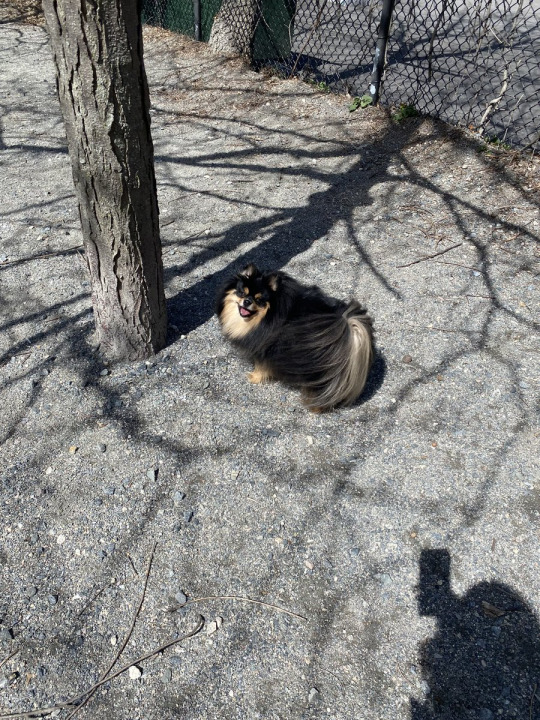
10 notes
·
View notes
Note
How does "AFO gave Tenko Decay" theory being confirmed takes away from Tomura's agency? I'm just trying to understand your point of view. Of course, AFO is saying that none of the decisions Tomura made were his own, but that's simply an exaggeration of what we already knew. We already knew that AFO groomed him and that he was the reason Tenko saw the world in a certain way and why killing was a normal thing to him. And we knew that AFO expected Tomura to wish for more power. So what changed? AFO didn't make people on the streets ignore Tenko, didn't manipulate heroes into not seeing villains as people, and he didn't manipulate Tomura into wanting to destroy everything instead of becoming the new king of the underworld. Tomura made the decision to kill all heroes and destroy Japan. AFO being the one who created Tomura, which we already knew for years, doesn't really take away from the fact that it was Tomura who hurt and killed all those people. And if it does somehow take away from his villainy and the fact that he was the one who decided that he wanted to lash out at the world, shouldn't have people complained about this years prior to this? Because AFO being the main reason for Tomura being a villain was made obvious a very long time ago.
Same person as in the ask about Tomura's villainy not being taken away from. Forgot to add, but we have characters that did bad things and did mean them but are still should be treated as people - Dabi and Toga. None of their agency was taken away. Dabi chose to kill people fully aware, no agency being taken away here. Same with Toga. AFO never was their behind their villainy, he's only the reason why Touya survived. AFO is being sympathised with - through Yoichi. Who is the only one who was genuinelly upset seeing his brother die, and who is the only person AFO ever actually loved in his own way. The only person all of this OFA hunt and vessel-raising was done for, from AFO's perspective. Redemption, atonement and salvation are something one has to want, it's a choice someone has to make. He is treated as this Evil because AFO had all the opportunities to change and never took them. He can't trust people because it would mean giving away something from himself. He is someone who got stuck with emotional maturity of a toddler and could never make the right choice - and it's not his fault. The narration from his backstory is very much sympathetic too.
You're welcome to disagree with me, Anon. But the irony is that you're stating exactly my problem with it: that it's
simply an exaggeration of what we already knew.
Although I'd argue it's more like shooting a spider in terms of exaggeration. Like, there's escalation, and then there's "are you okay" levels of exaggeration. And when you have an exaggeration to this level, you better have a good reason for it. That spider had better be hoping to end the world. But here... that's not the case.
My main point is that: if it doesn't add anything to a story, it shouldn't be there. Yeah, that's harsh, and enjoyment is something added, etc. But, at its most stringent, a plot twist must add something to the story--to its meaning, to illuminate the past chapters, etc. This doesn't do that, which you're kind of even pointing out yourself. And it's such a big reveal, given a horror factor, that it doesn't work to just ignore it either.
I think AFO literally orchestrating Tenko's BIRTH is like... so out of the realm of "grooming." It's into the realm of "defies reasonability and is almost laughable." It's not a parallel or commentary on real life society with subtext, which BNHA has tried to maintain for a long time. Instead it's like... it's such an escalation that it shatters immersion.
What does this add to the narrative? Honestly, it adds nothing that we didn't already know and makes what we already knew "oh wait not actually the most important part," and hence it's not a good reveal.
Like, it wasn't foreshadowed. Was anyone thinking that AFO had orchestrated Shigaraki's birth? It wasn't really implied at all. The quirk thing was implied, but this is just... a dramatic escalation.
It adds nothing in a subtext sense either. Predators irl seek out children who are vulnerable. They don't orchestrate literally everything from creating their very existence by urging their parents to have kids.
The funny thing is that I'm not actually opposed in theory. But in execution, it's bad. See, as much as I'm saying "this is ridiculous," it's because the story as set up didn't set this up.
It could work much better as commentary on social realities like the Todoroki quirk marriage. However, as is, it's nonsensical given that we know AFO was looking at other kids as possibilities. So it also has a whiff of retcon. Again, it could have worked if the story had played more into the god complex or hinted that Kotaro was being manipulated or whatnot. But BNHA hasn't done either of those things. So again I ask, why?
Thematically, one of my favorite aspects of BNHA is society's nuanced flaws. Yes, the flaws that hurt Shig all still happened. Tenko was still ignored. So if society is a problem, then why does Horikoshi need to portray one geriatric dude with a weird interest in strangers' sex lives as the entire reason Shigaraki even exists? Does this add to that theme? It does not.
It adds nothing beyond making it a moral necessity to save Shigaraki.
We also don't have any hint that we're not to take it at face value or to think it's a distortion; Deku isn't challenging him on this. It'd be easy to throw something like that in there, but it's not there.
Anyways, this is my opinion. You're welcome to disagree, and like I said, I'm still cheering for Shigaraki.
15 notes
·
View notes
Note
I'm really worried now about how bnha is going to end. I fell in love with the story because a lot of horikoshi's hero characters (nana, enji, hawks for example) were allowed to have flaws while his villain characters were still painted as sympathetic and human without having their villainy be erased. Now I'm feeling like hori is trying to turn this into a good vs bad kind of thing and the message is going more and more into the direction of some people are in fact born evil. on the one hand, we are constantly being told that all villains are human and that deku is special because he can see that, on the other hand we have AFO who is supposed to be the bad guy behind it all and heartless and whom the narrative never sympathizes with. it's all very odd to me. You could potentially argue that afo is a product of his environment and that nana, Kotaro, and shigaraki all made their choices in the end no matter how much they were being manipulated, but I got the feeling that the narrative doesn't believe that and even if it does, it bothers me that it refuses to acknowledge it. it feels so empty and cowardly, like horikoshi can't decide between "this guy is the big bad and just pure evil" and "every villain has a human heart" and like he doesn't actually believe in redemption as a concept, only in good people who do bad things but don't mean it and bad people who are really just bad. there's just something gross about it in general
I mean... yeah. That's why it's a thematic mess.
I will say that I think Hori isn't attempting to argue that he doesn't believe in redemption; it's more that
he wants to please everyone, and actually
he wants everyone to root for redemption.
By Trying to Please Everyone, You've Pleased No One.
I've actually talked about this before particularly in regards to the Endeavor arc, where it felt thematically confused because he was trying to placate both sides--people who didn't want Enji redeemed because they feared he would wash away the abuse, and people who wanted him redeemed. And we know Horikoshi initially had different plans for Enji but changed it, so this is partly to blame as well.
But the reality is it's a stronger story if the story isn't written to be enjoyed by everyone. If people can dislike parts of it. Even if people scream about how it's morally bad for saying circumstances influence how people become or something like that. (Those attacks come from genuine pain, and I honestly get the feeling that Hori is very, very aware of this, especially considering how visceral he writes abuse. But that doesn't mean they are themselves valid criticisms.)
You can't please everyone. You just can't. No one wants every single ice cream flavor melted together. Not every story will be for everyone. And no, that doesn't mean you should be deliberately hurtful, but if you're writing a story where the abuser is redeemed, if you want to portray the abuser as human, some victims may not want to read it. But many will want to read it. And both are okay. Some people will misunderstand you, and that's just--life.
The reality is that in this world everyone has competing needs, and what can meet someone's need doesn't meet another's, and that's okay. The beauty of humanity is that with all the billions of us on this earth, someone should be able to help meet someone else's needs in a certain area. You can't feed everyone, but you can feed someone, and watering down the story so that it's basically now devoid of nutrients/what makes a story interesting doesn't actually help anyone. By trying to please everyone, you've pleased no one.
Hori Is Very Pro-Redemption
I genuinely think Hori somehow decided to try to make Shigaraki extremely palatable not because he doesn't believe in redemption, but because he wants everyone to believe in it and root for Shigaraki.
It's not unique for him to retcon characters' mistakes; like I said, he's done this with Enji, with All Might, and with Hawks where he very obviously swerves from the initial plan. However, that weakens the very themes and the characters, and makes the story less interesting and objectively less well-written.* And now this AFO reveal, considering it's the main plot, kinda throws these more subplot ideas to the back burner and weakens the entire frame of the story rather than just the subplot.
So Hori's into redemption. The problem is that he doesn't know how to convince everyone that redemption is worth it, and so makes it so obvious that it's devoid of any actual interesting questions we can ponder. Essentially if you refuse redemption for Shig now, what's wrong with you? It's nigh morally impossible not to.
But I, Redemption Arc #1 Fan, like it when it's questionable. Redemption, for me, is never about deserve.
It's disappointing, but I've also seen way worse lol in terms of thematically undermining a story at its ending. So, no, I'm not happy about it and I will critique it. But I still want to see the characters I've loved for so long get their happy endings.
*Yes, "good writing" is an opinion; however, there are general consensuses of what constitute good and bad writing. This type of thing--removing agency completely in the last hour--is bad writing.
20 notes
·
View notes
Note
What do you think of what has happened in the recent chapters of MHA?
I don't want to be overly negative, but... the short version is I don't like a certain key fact and it's borderline ruined the story for me, at least in terms of thematic impact. I'm still interested to see how the characters end up, particularly the League, and reading for them.
The AFO reveal is honestly kind of... boring to me. I just don't care when it's a sudden "surprise! Bad decisions weren't our bad decisions after all!" This trope is consistently a pet peeve of mine (looking at you, flower plot in 2ha), almost as annoying as "it was all a dream," because I feel like it's similar: a bait and switch. Don't make me care in one way and then tell me "never mind, it's actually much simpler and you don't have to actually ask all those pesky moral questions."
Setting a character up to have lacking agency be their whole thing is great. Setting a character, or in this case characters, to have absolutely none is thematically uninteresting. The questions about Kotaro's morality and Nana's are interesting. I want to ask them and wrestle with them! That's where the themes are found.
And sure, Shigaraki was always a grooming victim, and I've pointed that out millions of times. But the reveal that this went further than we could possibly dream to where Kotaro and Nana are basically... absolved, is just so unnecessary. It adds nothing to the characters or themes, but it does whittle away at the interesting flawed human aspect of it.
It's lazy writing that screams "I am not sure I did a good enough job convincing my audience he's redeemable so I'll hit y'all with a hammer" when in reality, if you ask me, Horikoshi should have more confidence. He's not perfect but he did convince many ppl of Shigaraki's redeemability. He didn't need to quash any possible discussion about it; leaving things for people to chew on is actually interesting.
46 notes
·
View notes
Text
Lewis and Theodore, Theory Post 2
After my crack theory post last year I have become increasingly convinced that Theodore is, in fact, Lewis. or at least a descendant.
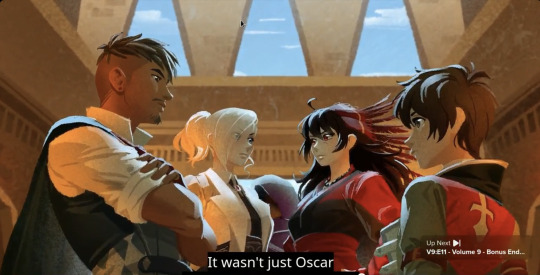

Listen, again, the story of Dorothy (Theodore's allusion)--a kid who gets whisked away to another world and gets to go home completely changed--matches so well with Lewis's as Volume 9 spelled out.
The design--hair and outfit--kinda strongly hint for me that Lewis is either Theodore or an ancestor of him. Especially considering that Sun and Neptune both state that the headmasters might have the answer as to where RWBYJ are.
50 notes
·
View notes
Note
Was there a love relationship between Kafka and Milena?
I think it's pretty clear there was, at least on an emotional level.
2 notes
·
View notes
Note
Do you think Vox and Alastor used to be close or do you think it was hate at first sight? It kinda feels like how Fizz and Blitz set up was in HB so if makes me wonder if they were close once
I am not sure we have enough to truly speculate.
If anything, though, given that Vox is a TV demon and Alastor a radio one, I would guess that Vox may have once been more amenable to Alastor and Alastor has never been amenable to Vox. But that's pure speculation and I could be wrong--I'm looking forward to seeing their backstory!
edit: @aspoonofsugar reminded me:
I think the series implies they used to be friends. In the final song we see a picture of Alastor and you can see it was originally a picture of both him and Vox... if they have a pic together, they were probably friends tbh... We'll see anyway!
So yeah, they were probably at least cordial. I honestly wonder if Alastor found himself as a pseudo-mentor to Vox, and then Vox got new ideas, and we'll see.
8 notes
·
View notes
Note
Heyy, wanted to ask you if you've watched arcane!
I have. I didn't really enjoy it, though it was well-made.
1 note
·
View note
Note
do you think the song out for love says something about Camilla and veggie and to veggies character arc
Hi!
Yes, it does. I want to talk about Vaggie in other metas too, so in this analysis I will focus on her relationship with Carmilla, since this is what you are mainly asking about.
Before I start, though, I am gonna link to you this meta by @hamliet, where she talks about the main message of the song:
You're gonna fight without gloves
And when that push comes to shove
Yeah, you just might rise above
Long as you're out for love

If you love, you might rise above. So Vaggie, a fallen angel, regrows her wings by choosing love and protection over hate and revenge. The meaning is crystal clear. Love makes you worthy of Heaven. Just like in the finale Pentious ascends thanks to his selfless sacrifice.
This is the meaning of the song when it comes to theme and to the series as a whole.
At the same time it is not by chance this theme comes out so strongly in relation to Carmilla and Vaggie, as they are both tied to "love".
FAMILIAL LOVE AND ROMANTIC LOVE
Carmilla Carmine: So I, I'll be your keeper
Do whatever it takes, I'll make the mistakes
I'll keep you safe and keep this secret
Vaggie: So I, I'll be your armor
Do whatever it takes, I'll make the mistakes
I'll spend my life being your partner
Carmilla and Vaggie are set up as foils in episode 3, when they share the song Whatever It Takes. This ballad is a love song, but Carmilla and Vaggie express two different kinds of love:
Carmilla is singing to her daughters (familial)
Vaggie is singing to Charlie (romantic)
This is a pattern throughout the show:
There are two versions of More Than Anything - the first one is about a familial bond, whereas the second explores a romantic relationship
Sir Pentious gets redeemed after expressing his feelings for Cherri (romantic) and sacrificing himself for the Hotel Crew (familial)
So, Hazbin Hotel goes out of its way to celebrate all kinds of positive bonds: platonic, romantic, familial. All of these relationships are enriching and help people grow. Vaggie and Carmilla are two characters linked to this very concept, as they are ready to fight and suffer for their loved ones:
Both: Whatever we go through
I know I~ (Carmilla: I'll be your keeper)
(Vaggie: I'll be your armor)
Whatever it takes (Carmilla: I'll make the mistakes)
(Vaggie: I'll make the mistakes)
Whatever it takes
They are both warriors, but fight for love. They are out for love. However, Whatever It Takes also highlights a major difference between them.
TRUST AND SELF-EXPRESSION
Scrambled Eggs is an episode about trust. This is true especially for Carmilla and Vaggie, who have opposite secrets:
Carmilla killed an angel
Vaggie is an angel
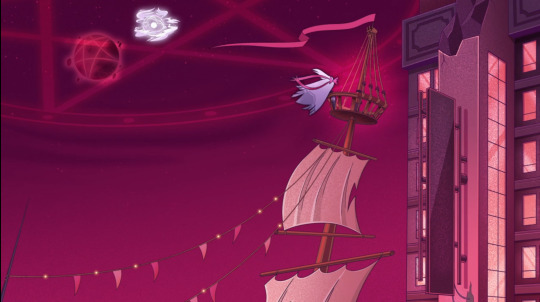
Throughout the song the conflict between Heaven and Hell is mentioned by Carmilla and is present in subtext in Vaggie's stanza, as she looks at her old home.
Both are struggling under the pressure of these truths and are confronted by a loved one:
Zestial: Carmilla, what troubles thou? Losing thy composure is unlike thee.
Carmilla Carmine: It's nothing, Zestial, really.
Charlie: Vaggie, don't say that! You do so much! It's-
Vaggie: I'm sorry. I'd… I'd like to be alone for a minute.
Carmilla chooses to open up to Zestial and tells her daughters how much she loves them. Vaggie instead closes herself off and refuses Charlie's attempt to talk. She is singing to Charlie, but Charlie herself isn't present to hear her out. Even when it comes to their respective secrets...
Carmilla says hers in the song:
Carmilla Carmine: I always thought that I would keep blood off my face
But when that thing attacked, I had to act
To cross that line and keep them safe
But if anyone knew, then all of Hell would rise to war
And who's to say who'd survive the fray?
I might lose the ones that I was killing for
Vaggie only alludes to hers in the lyrics:
Vaggie: When I saw your face
You made me feel like a stranger in a brand new place
And it felt so good to be understood
But there's so much I wished that I could say
Vaggie meets Charlie and feels like a stranger in a brand new place because at the time she is in fact a stranger in a brand new place:
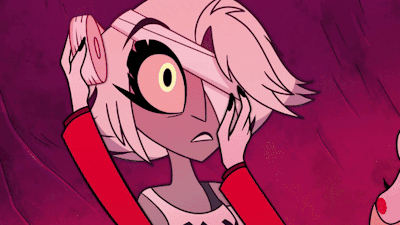
So, Carmilla is able to express herself, while Vaggie can't. This isn't surprising, as Vaggie is basically a child-soldier:
Adam: Do you really think I wouldn't recognize one of my top girls just cuz you're out of uniform? You were on the front lines, I wouldn't forget a bad bitch like you. It's why I named you after the best thing ever. Vaggie.
She is brought up in Adam's army and is taught that love is conditional. She is one of Adam's best fighters, but the moment she makes a "mistake", she is discarded:
Lute: Sinful filth like you has no place in heaven.
This is why she feels Charlie will love her only if she is useful and never messes up:
Vaggie: I'm supposed to make your dreams a reality. I'm supposed to protect you. I'm supposed to never fail you. (...) If I can't help you, what's the point of me?
This fear of abandonement and rejection is also at the root of Vaggie's inability to tell Charlie about her past:
Adam: I guess I'll just tell little miss butterflies and rainbows that she's been fucking someone who's killed-- thousands of her people. I'm sure your relationship will be fine.
Still, despite her communication issues, Vaggie's heart is in the right place:
Rosie: If there's anything I've learned, it's that words are cheap, but actions, they speak the truth. So, what have her actions said?
Vaggie is a person of few words. This may be why she has less songs than other characters. Still, she lets her actions speak, so she is given a ballet lesson by a very talented ballerina:

DANCING THROUGH LIFE
Carmilla has a ballet motif, as her outfit resembles that of a ballerina and her two daughters are called after protagonists of famous ballets. So, it is only natural that she teaches Vaggie a new way to fight through dancing.

Vaggie was taught to fight with hate and anger. So, her fighting style is aggressive and focused on attack:
Carmilla: You leave yourself open with every swing. You fight like someone unafraid of harm, and this is what you'll take advantage of. Angels wield no shields, little armor and fight with reckless abandon.
Carmilla tells her she should instead dedicate herself to love, protection and defense:
Fuel yourself with the fear of losin'
That somebody who's your reason to live
Harnеss your heart and you can't help choosin'
To fight with all you can give
Vaggie shouldn't just fight. She should dance:

She shouldn't hate:
I see you're driven by your detestation
Your every step is stoked with animus
You need a different type of motivation
Or there's no way that you can handle this
She should love:
Out for love~
Love~
Think of who you care about
Protect them and be out
For love~
Love~
Vaggie listens to these teachings and applies them in the finale, in two ways.
She sings her love for Charlie in More Than Anything Reprise:

Vaggie: You've already done so much
So many lives you've changed
So many souls you've touched
And in the end, if it's only me you've saved
Charlie and Vaggie: There's something that I've been dying to say
More than anything, more than anything
Need you to know I love you more than anything
More than anything
As stated above, Vaggie doesn't sing much in season 1, but in the final episode she gets a short moment to express how she feels to Charlie. This is in contrast to Whatever It Takes, where she sends her girlfriend away before she starts singing. More Than Anything Reprise shows Vaggie's progress when it comes to self-expression.
She follows Carmilla's advices while fighting
On a practical level she covers herself up in a battle suit inspired by Carmilla's outfit, she wears a harness on her heart and ties her hair:
Vaggie: I'm not used to fighting with long hair.
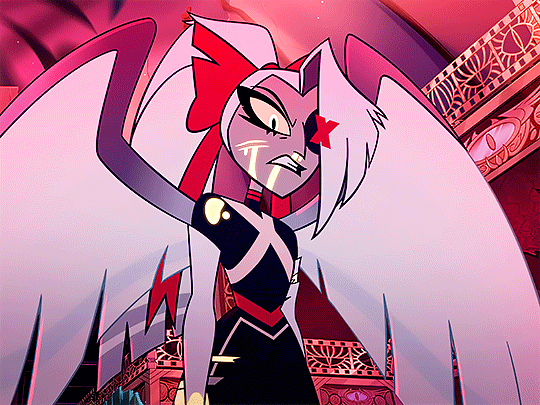
On a thematic level she reveals her wings and defeats Lute, when the exorcist threathens Charlie:
Lute: So, I'll spare you the pain of seeing your demon bitch die.
And Vaggie eventually chooses not to kill the other angel:
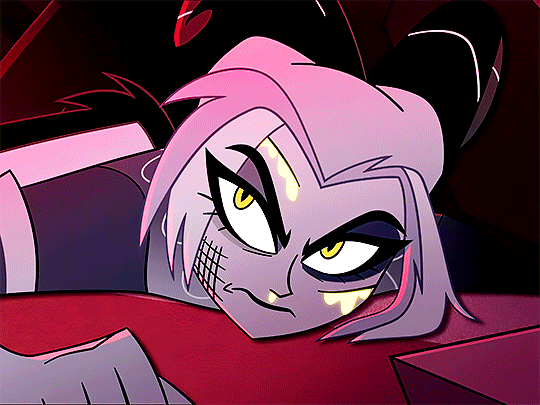
Lute: Do it, then. Correct your mistake.
Vaggie: Seriously, you're pathetic, you know that? Ready to die rather than accepting mercy? No, live. Live knowing that you only do because I let you, the failure.
Vaggie is asked to choose between her hate for Lute and her love for Charlie and she chooses the latter. This is why the scene ends with Vaggie leaving Lute and flying to help Charlie. She is given the chance to get revenge, but doesn't take it. She is given the chance to hate, but she loves:
I know you're thirstin' for vengeance, Vaggie
You're out for blood
But you'll only stand a chance if you're out for love
This is important in two ways:
1- The macrochosm - Vaggie refuses Lute's ideals and defies her expectations. For Lute it is normal that Vaggie is going to kill her. After all, Vaggie is discarded because she shows pity to a sinner, which makes her weak. Still, Vaggie bests Lute in a fight, so she is now strong. It is only obvious then that Vaggie has snapped out of her foolery and is ready to kill. She can correct her mistake. She did not kill the cannibal child, but she can kill Lute. This is how Lute understands the world. And yet, Vaggie doesn't finish her off. By doing so, she moves away from the mentality Lute embodies. She is strong precisely because she can show mercy. Adam is wrong. Lute is wrong. Vaggie isn't out for blood. She is out for love.
2- The microchosm - Vaggie sparing Lute isn't just the morally correct choice, but it is Vaggie's first step into healing:
Husk: (To Vaggie) This one. Judges everyone and everything because she hates herself.
Vaggie hates everyone because she deep down hates herself. She despises Heaven and Angels because she can't forgive her involvement in the exterminations. So, Vaggie hurting Lute would be Vaggie hurting her past self. As a matter of fact Lute is Vaggie's dark mirror. She is who Vaggie might become if she gives in to hate.
A person who hurts others:

And herself:

Vaggie instead has to value her life, so that she can protect others. She must save others and heal herself. Only in this way she can be by Charlie's side. She needs to let go of self-hate to embrace a healthy love. Vaggie's arc is her learning self-love through her bond with the Princess of Hell.
Obviously this journey is just at the beginning and our Angel of Love has a long way to go. How will her story contiue? We can make some hypothesis, which once again stem from Vaggie and Carmilla's foiling. This is just a theory, so take it with a grain of salt, but Vaggie may have a secondary personal antagonist in Hell:

Why is that so? It's because Scrambled Eggs sets Vaggie and Velvette up as foils.
RESPECT(LESS)
Velvette and Vaggie are opposites in their interactions with Carmilla. Both girls are younger than the Dancer Overlord and could learn a lot from her. However, Velvette refuses any kind of mentorship and shows no respect:
Velvette: Mad that I acted respectless? Well, it's cause no one could respect this!
You're long past trending! Sorry, bae, but I ain't swiping right! You've lost your relevance-
Vaggie instead comes to respect Carmilla and learns from her:
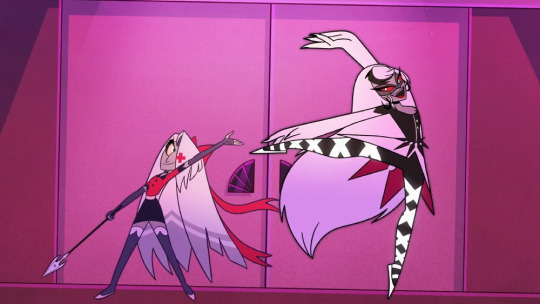
At the same time, both Velvette and Vaggie confront Carmilla about her secret:
Velvette: 'Oops!' Did I strike a nerve?
'Cause when I brought out the angel's head, couldn't help but observe, that your wrinkled face was turning red!
And why are you avoiding war? That's what the guns you sell are for!
Thanks to my being respectless, one thing I'm starting to suspect is
You know why this angel's headless! Do you have a disclosure?
Vaggie: I know what you did on extermination day. We can talk about it inside, or I can yell about it out here.
They call Carmilla out on killing an angel and keeping this knowledge to herself. Not only that, but both argue that it is necessary to fight back to stop the exterminations:
Velvette: We found it during Extermination day. If these Holy Rollers can be killed, the game has changed. We can take the fight to them. The boys and I have come up with a full assault plan!
Vaggie: Miss Carmine, I'm here on appointment from the princess to enlist your aid in the defense of hell from the angelic extermination. We know an angel fell at your hands and we need to know how.
Still, Velvette fails to get through to Carmilla because she uses war rhetoric:
Velvette: Oh, I get it. So Grandpa is too pussy to fight, so I guess there's no point, right? Oh, what's the matter, Fossil? Too senile to make a real power grab...
She speaks of violence, strength and power.
Vaggie instead convinces Carmilla to help because she mentions the necessity to fight for loved ones:
Vaggie: We didn't pick this fight, but it's here now. And they aren't going to stop with us. You didn't see the look on their leader's face. With us out of the way, it's only a matter of time before they come for the rest of you. They won't stop until all of hell is wiped out, so you can help us make a stand here together, or you can stand alone tomorrow.
She speaks of protection, love and comraderie.
In short, Vaggie succeeds where Velvette fails. Of course, this is true for Charlie's group in general when it comes to the Vees:
Vox: My dear people! We at VoxTek Enterprises have always been at the forefront of innovation. And now, with this new oncoming threat, we are shifting our focus, to your protection. We are pleased to announce VoxTek Angelic Security is coming soon! Trust us, with YOUR safety.
Katie Killjoy: Breaking news - Extermination day is cancelled! Charlie Morningstar managed to fend off the angelic attack with more than just nice words.
The Vees make big declarations of how they are gonna protect the people of Hell, but in the end it is Charlie and her friends who fight for the sinners.
When it comes to Vaggie and Velvette specifically, it is going to be interesting if their foiling is expanded. If so, then I guess Velvette is gonna help Vaggie mature a little bit more, so that when our ex exorcist faces Lute (her nemesis) again, she is gonna be ready for it.
#hazbin hotel#vaggie hazbin hotel#vaggie#carmilla carmine#velvette hazbin hotel#chaggie#charlie x vaggie#hazbin hotel meta
108 notes
·
View notes
Note
What do you think of Huskerdust as a ship? Do you think they’ll be a healing and safe place for each other or do you think they will be more angsty in season 2?
It's OTP. But for your question:

Let's be honest, Husk is going to mess up. Angel casting longing glances after him when Husk is turned away this season = Husk doesn't know that Angel is falling for him. Angel has been used in hell; Husk has used as a soul gambler.
Now, I don't think Husk will take advantage of Angel in any way. I see Husk's issue as being probably unable to understand that Angel is really falling for him, genuinely--especially since Angel kept coming onto him as a form of self-harm earlier. Probably out of genuine feeling, but Angel has 0 idea how to express attraction in a healthy way and is only just starting to learn how to do that.
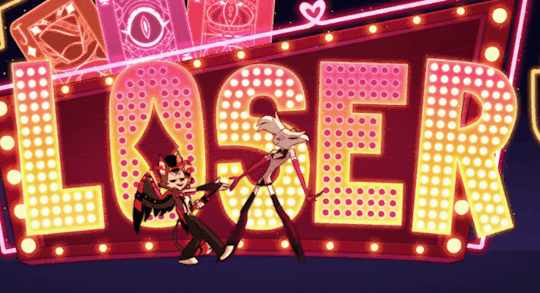
I'm not entirely sure where Husk's arc will go, but I wonder if he's going to struggle with the idea of self-love. I don't know that he'll trust that Angel genuinely loves him, and I don't know that he'll see himself as someone who is good for Angel even if the feelings are mutual. Husk strikes me as the gruff "in denial" type, but I could be wrong about this. We'll see.
It's just that Angel's protection mechanism is pretending he's FINE thank you and overcompensating for his self-loathing with acting like he loves his situation in hell and has it all under control. Husk is the opposite: he's okay with being a loser, which is good because that's exactly how he challenges Angel to grow: by accepting that he doesn't have to be in control or winning all the time.
Considering their names and symbolism, I wonder if Husk might have a hard time accepting that he can be more than, well, a husk. That he doesn't have to stay a loser, or that he can be both loser and "angel,"and an Angel can choose him.
But yeah. That's speculation. The tl;dr is that I expect Husk to break Angel's heart for a bit, only for them to overcome it together in a thematic and climactic moment that depicts everything HH is trying to say about love, redemption, forgiveness, and grace.
#ask hamliet#huskerdust#hazbin hotel husk#husk#angel dust#hazbin hotel#hazbin hotel meta#hazbin hotel theory
73 notes
·
View notes
Note
Hey!! Long time no see! How are you doing? I'm so happy to see you're into the Hellaverse, I fell head first into it when Hazbin Hotel came out, and I binge-watched Helluva Boss, Stolas has my entire heart. I'm both excited and stressed out for the next episode haha, I want Stolas and Blitz to be fine and really together eventually but I know they have a long road ahead of them and desperately need to TALK u_u
Hello!! I have been okay; you??
I think they will be together in the very end of season 4 (which I believe is set to be the last?). Communication is their Achilles' heel and has been ever since like... well, Blitzo was traumatized by trying to communicate, and it's been dogging him ever since, and Stolas as well with his ex. That said, I definitely see them having happy ending!
4 notes
·
View notes